
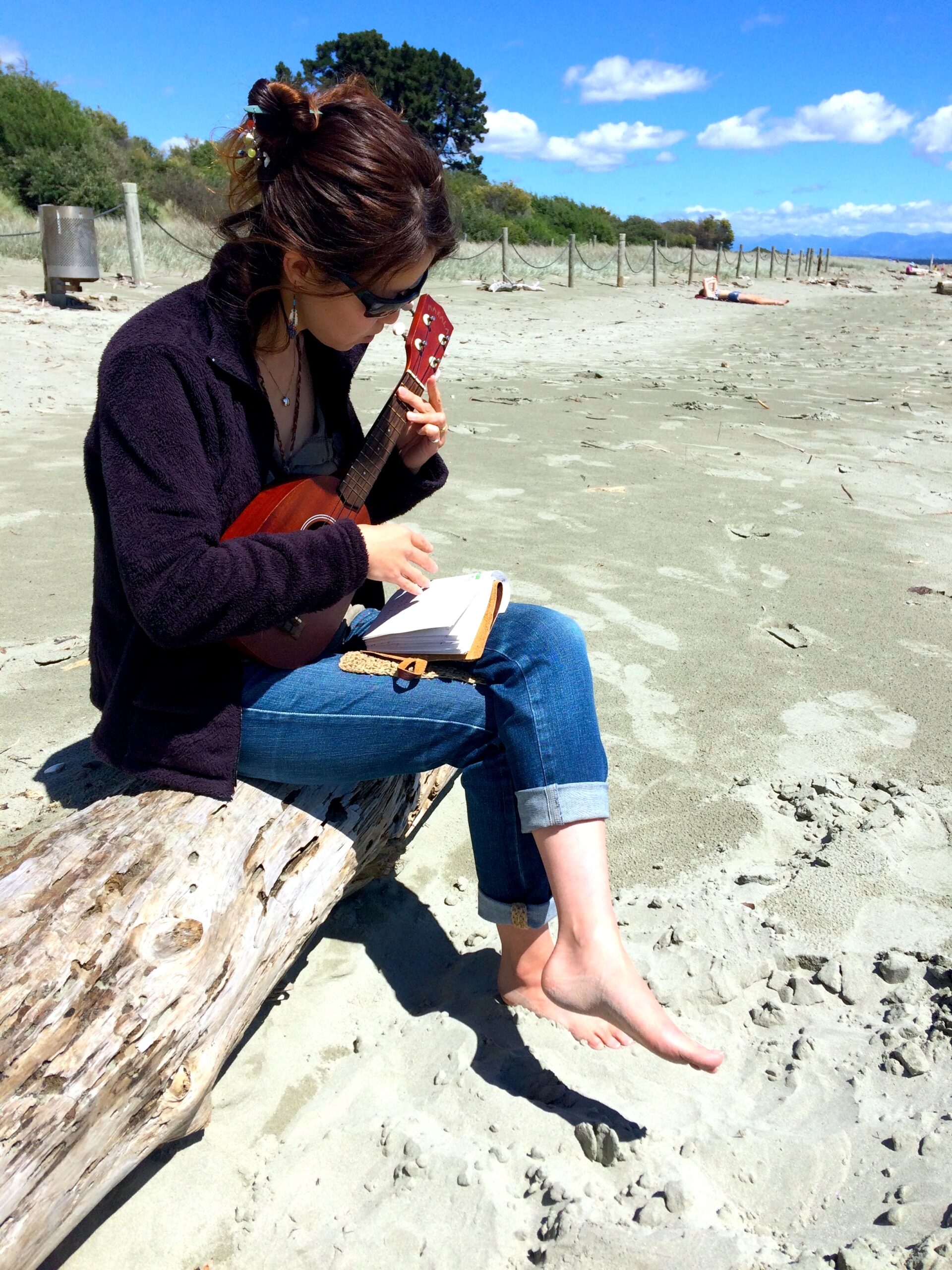
Tokyo isn’t just Japan’s capital—it’s one of the world’s most visited cities, welcoming millions travelers each year. Here, centuries-old shrines glow beside neon skylines, and tradition meets pop culture at every turn.
This 2025 guide highlights dozens of must-see attractions and unique experiences, tailored for first-time visitors and seasoned travelers alike. Discover classic landmarks, seasonal highlights like cherry blossoms and autumn foliage, rainy-day ideas, and exclusive VIP experiences.
Packed with insider tips, this guide ensures your Tokyo trip—whether hosting international guests with true omotenashi or exploring for yourself—becomes truly unforgettable.
※Information is current as of August 2025.
Top Tokyo Attractions for Travelers

Short on time or visiting Tokyo for the first time? Start with these iconic spots. Each destination below captures a different facet of Tokyo’s charm—from ancient temples and soaring towers to scramble crossings teeming with life.
These are the “only in Tokyo” sights that consistently wow foreign visitors and provide that “Yes, I’m really in Japan!” feeling.
There is also an article that introduces a model course for sightseeing in Tokyo according to your partner’s preferences. Please take a look at it for reference.
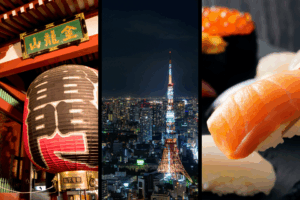
Senso-ji Temple in Asakusa
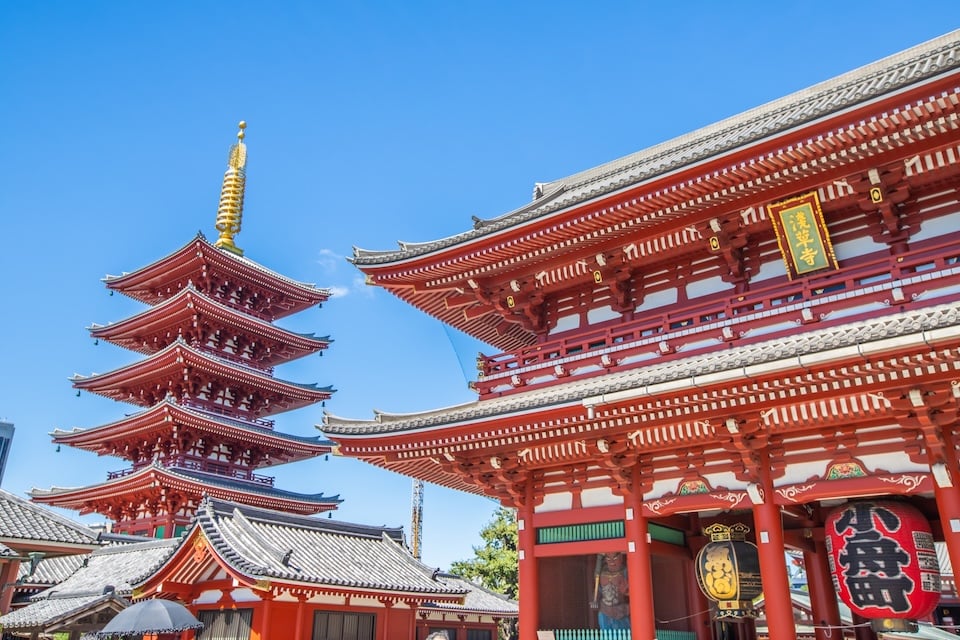
Senso-ji Temple in Asakusa is Tokyo’s oldest and most vibrant Buddhist temple, blending history with living tradition. From the iconic Kaminarimon gate to Nakamise street snacks, it’s a must-see that captures the spirit of “old Tokyo.”
- Iconic Kaminarimon (Thunder Gate) with its giant red lantern
- Bustling Nakamise-dōri lined with street snacks and souvenirs
- Magical evening atmosphere with lanterns glowing around the temple
Details: Senso-ji (浅草寺, Sensō-ji)
| Item | Information |
| Access | 5-minute walk from Asakusa Station (Ginza, Asakusa, Tobu Skytree, Tsukuba Express Lines) |
| Hours | 6:00–17:00 (Oct–Mar: opens at 6:30). Grounds open 24/7 |
| Admission | Free |
| Official website | Sensoji |
Tokyo Sky Tree
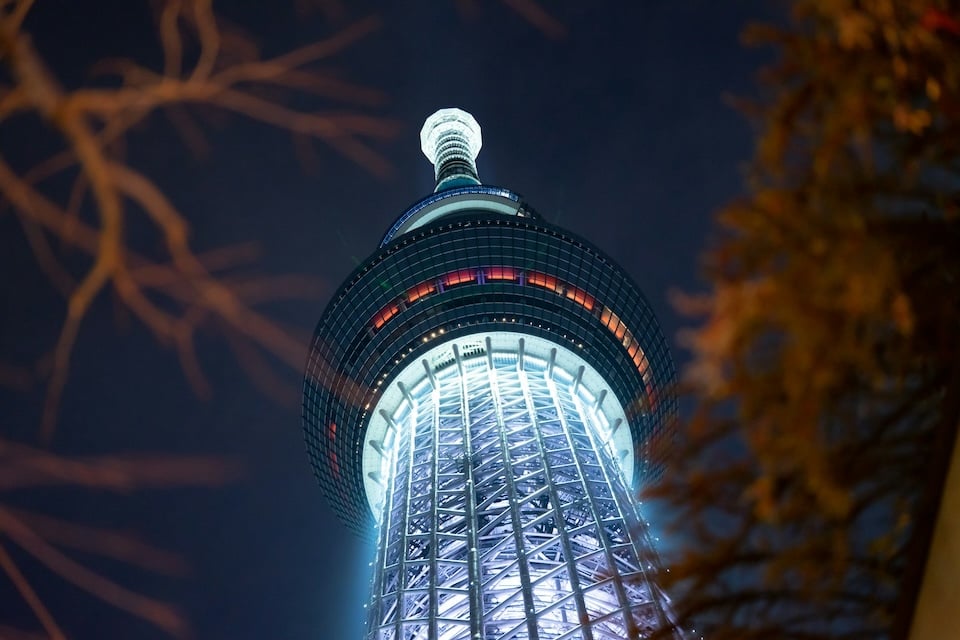
At 2,080 ft (634 m), Tokyo Skytree is a symbol of modern Tokyo, offering breathtaking views and a full day of entertainment. From dizzying observation decks to Solamachi’s shops and aquarium, it blends cutting-edge design with rich cultural touches.
- Panoramic observation decks with Mt. Fuji views on clear days
- Thrilling glass-floor panels 1,100 ft above the ground
- Tokyo Solamachi mall with 300+ shops, dining, and attractions
Details: Tokyo Skytree (東京スカイツリー)
| Item | Information |
| Access | Direct access from Tokyo Skytree Station (Tobu Skytree Line) or Oshiage Station (Asakusa/Keisei/Hanzomon Lines) |
| Hours | 9:00–22:00 (last ascent 21:00) |
| Admission | $16 (¥2,400) adults, $8 (¥1,200) children; combo ~ $23 (¥3,500) |
| Official website | Tokyo Skytree |
Shibuya Ward|Shibuya Scramble Crossing
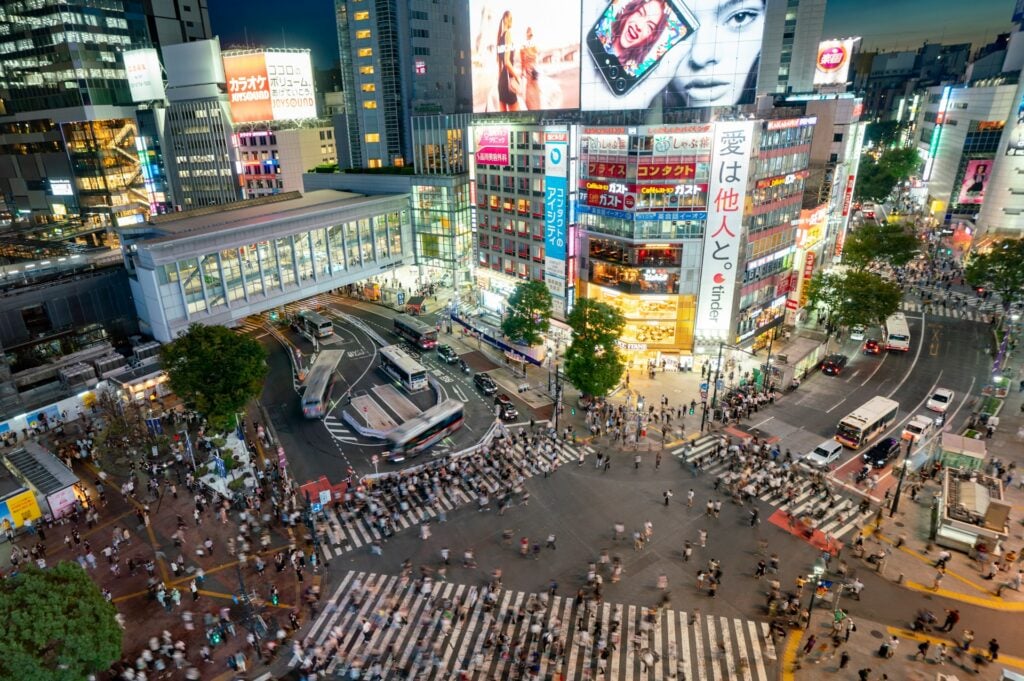
An iconic symbol of Tokyo’s energy, Shibuya Crossing combines neon lights and massive crowds with cinematic vibes. Just steps away, the loyal Hachikō Statue adds a heartwarming touch to this buzzing hotspot.
- World-famous scramble crossing with up to 3,000 people per light cycle
- Towering neon screens and a Times Square–like atmosphere
- Hachikō Statue, the beloved meeting spot with a moving backstory
Details: Shibuya Scramble Crossing (渋谷スクランブル交差点)
| Item | Information |
| Access | Outside JR Shibuya Station (Hachikō Exit); also accessible via Ginza, Hanzomon, Fukutoshin Metro Lines |
| Hours | Open whenever traffic signals operate; lively 6:00 AM–midnight |
| Cost | Free (public street) |
Meiji Shrine and Harajuku Area
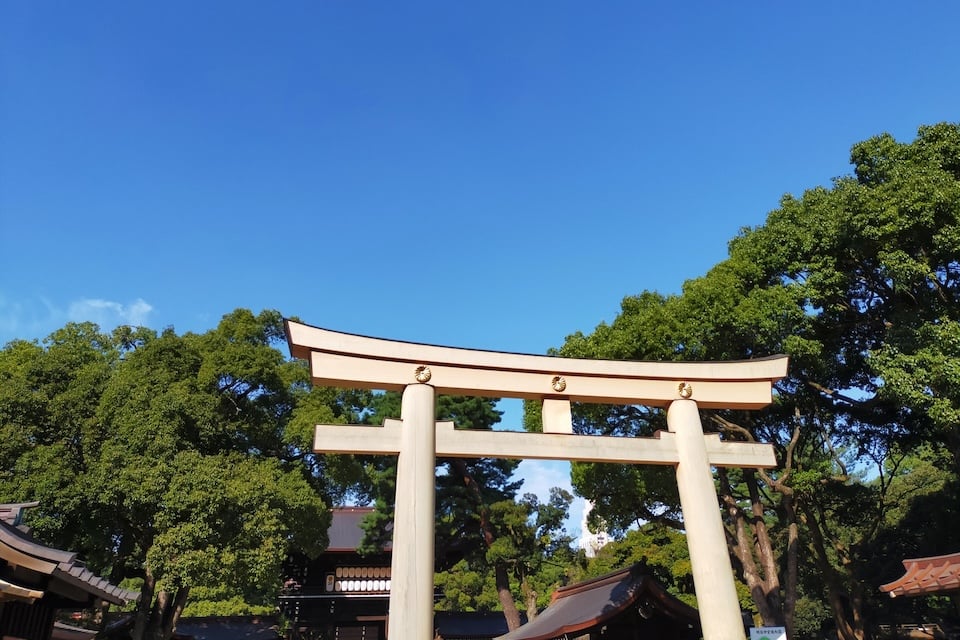
A serene Shinto shrine surrounded by a lush forest contrasts sharply with the vibrant, fashion-forward streets of Harajuku just steps away.
- Walk through towering torii gates and peaceful forest paths in the heart of Tokyo
- Witness cultural rituals like wedding processions, ema wishes, and omamori charms
- Stroll Takeshita Street for quirky fashion, crepes, and youth culture vibes
Details: Meiji Jingu Shrine (明治神宮, Meiji Jingū)
| Item | Information |
| Access | 1 min walk from JR Harajuku Station (Omotesando Exit) or 3 min from Meiji-jingumae (Chiyoda/Fukutoshin Lines) |
| Hours | Sunrise–sunset (~5:00 AM–6:00 PM, seasonal) |
| Admission | Free. Inner Garden: $3.50 (¥500) donation |
| Official website | Meiji Jingu |
Tokyo Tower and Zojo-ji Temple
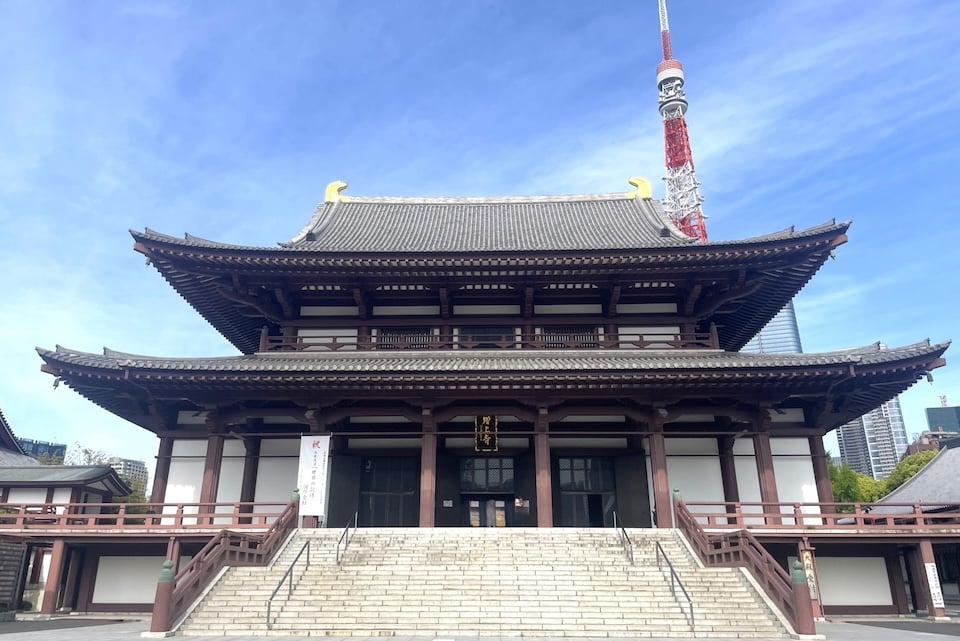
Tokyo’s iconic red-and-white tower rises above a historic Buddhist temple, perfectly capturing the city’s blend of tradition and modernity.
- Panoramic views from two observation decks, with Mt. Fuji visible on clear days
- Romantic night scenery with tower illuminations and glittering city lights
- Unique photo spot: Tokyo Tower soaring above Zojo-ji Temple’s historic gate
Details: Tokyo Tower (東京タワー) & Zojo-ji Temple (増上寺, Zōjō-ji)
| Item | Information |
| Access | Tokyo Tower: 5–7 min walk from Akabanebashi Station (Oedo Line)Zojo-ji: 3 min from Onarimon Station (Mita Line) |
| Hours | Tokyo Tower: 9:00–23:00 (last entry 22:30)Zojo-ji: 6:00–17:00 |
| Admission | Tokyo Tower: $10 (¥1,500) main deck; $20 (¥3,000) top deckZojo-ji: free (Treasure Gallery: $5 / ¥700) |
| Official website | Tokyo Tower / Zojo-ji |
Imperial Palace East Gardens (Kokyo Higashi Gyoen)
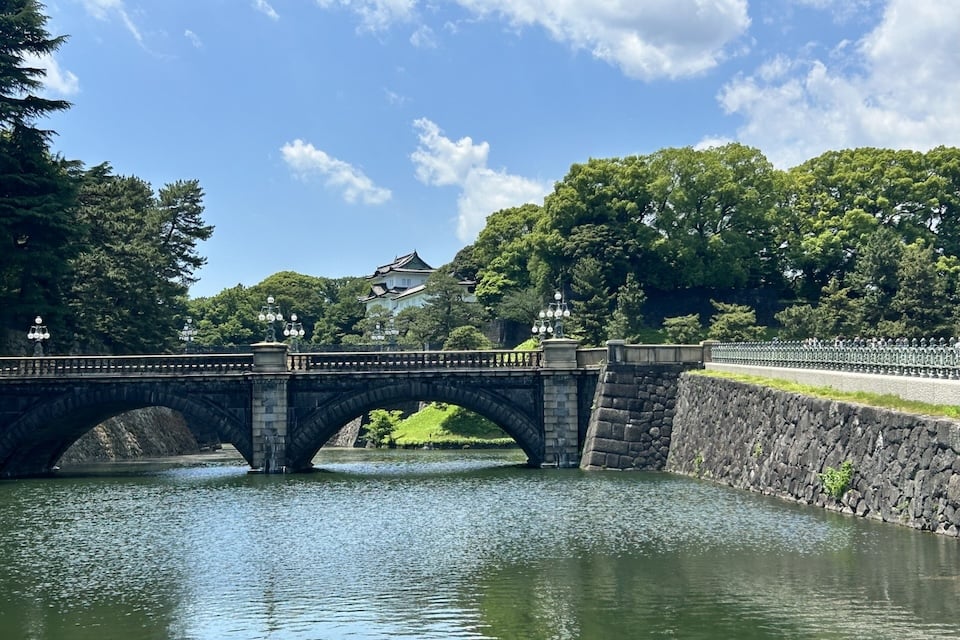
A peaceful oasis in central Tokyo, blending Edo Castle history with seasonal beauty in a spacious garden.
- Explore Edo Castle’s stone walls, gates, and Fujimi-yagura watchtower
- Stroll through Ninomaru Garden with koi pond, cherry blossoms, and autumn maples
- Free admission with bilingual signage and maps for easy navigation
Details: Imperial Palace East Gardens (皇居東御苑, Kōkyo Higashi Gyoen)
| Item | Information |
| Access | 5 min walk from Otemachi Station (exit C13a) or 15 min from Tokyo Station |
| Hours | Mar–Apr & Sep–Oct: 9:00–17:00May–Aug: 9:00–18:00Nov: 9:00–16:30Dec–Feb: 9:00–16:00(Closed Mon & Fri, Dec 28–Jan 3) |
| Admission | Free |
| Official website | Imperial Palace East Gardens |
Tokyo Station Marunouchi Building
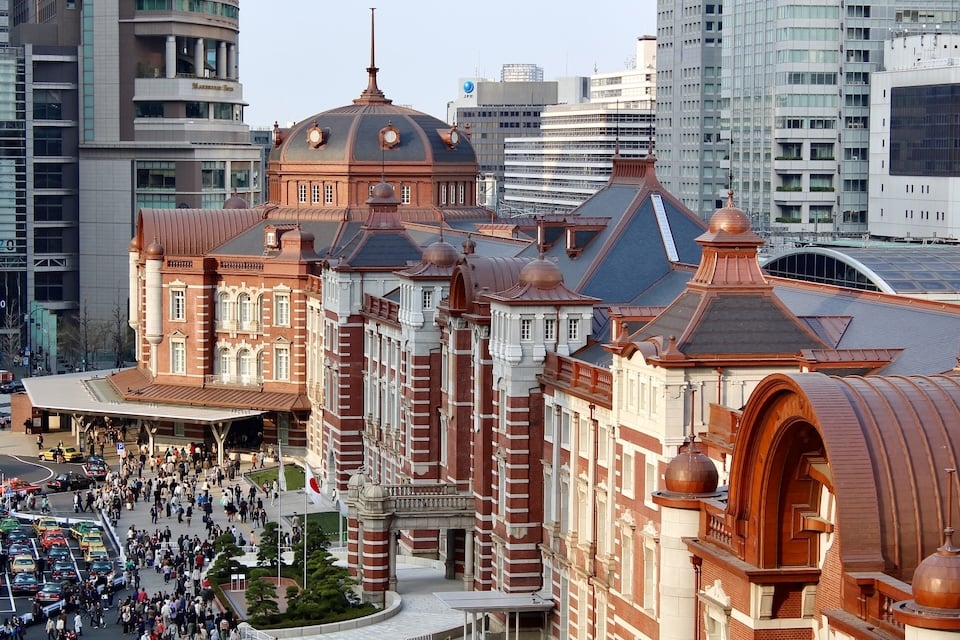
A beautifully restored red-brick landmark from 1914, Tokyo Station combines historic architecture, cultural gems, and modern shopping in the heart of the city.
- Admire the grand facade and dome ceilings with zodiac and animal motifs
- Capture stunning photos by day or night with atmospheric lighting
- Explore “Tokyo Ramen Street” and “Character Street” for food and pop-culture fun
Details: Tokyo Station – Marunouchi Station Building (東京駅・丸の内駅舎, Tōkyō-eki Marunouchi-eki-sha)
| Item | Information |
| Access | Directly served by JR (including Shinkansen) and Tokyo Metro (Marunouchi Line). Use Marunouchi Central Exit for historic side. |
| Hours | Station: ~5:00 AM–1:00 AM. Marunouchi exterior viewable anytime. Domes accessible during station hours. |
| Gallery | 10:00–18:00 (Fri until 20:00). Closed Mondays. Admission ~$10 (¥1,400). |
| Official website | Tokyo Station |
Authentic Tokyo Cultural Experiences
Looking to go beyond the typical tourist checklist and dive deeper into Japanese culture? Tokyo offers immersive experiences that showcase “old Japan” within the modern city. You can watch epic kabuki dramas, enjoy tea ceremonies, explore Edo-period museums, and relax in neighborhood bathhouses.
Kabuki at Kabukiza Theatre
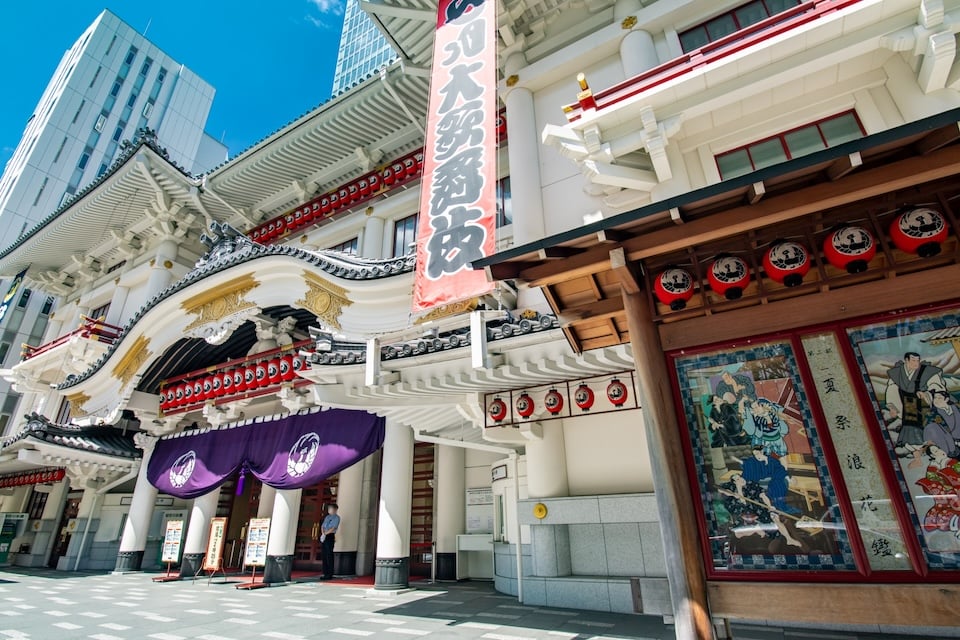
Step into Edo-period pop culture at Kabukiza, Tokyo’s principal Kabuki theater, blending centuries-old tradition with modern comfort.
- Admire the grand facade of traditional Japanese architecture in Ginza
- Watch world-class Kabuki with English subtitle headsets for visitors
- Try affordable “Hitomaku-mi” one-act tickets for a short yet authentic experience
Details: Kabukiza Theatre (歌舞伎座, Kabukiza)
| Item | Information |
| Access | Directly at Higashi-Ginza Station (Exit 3, Hibiya/Asakusa Lines). 5 min walk from Ginza Station; 10 min from JR Yurakucho. |
| Performances | Monthly programs; shows ~11:00 AM and 4:30 PM, with 2–3 acts. |
| Tickets | Full show: ~$28–140 (¥4,000–20,000+). One-act: ~$7–14 (¥1,000–2,000, same-day only). |
| English Support | Headset rental ~$7 (¥1,000) + deposit. English pamphlet ~$3.50 (¥500). |
| Website | Kabuki-za |
Tea Ceremony and Calligraphy Sessions
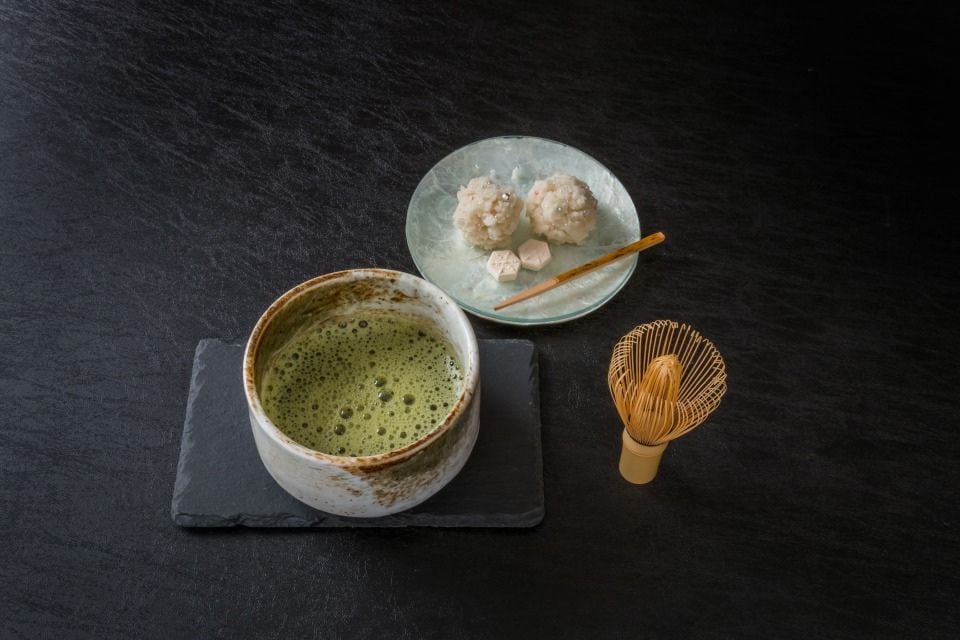
Immerse yourself in Japan’s refined arts through tea ceremony (茶道, Sadō) and calligraphy (書道, Shodō), where mindfulness and elegance meet cultural tradition.
- Join a tea ceremony with English guidance, savoring matcha and seasonal wagashi
- Learn Japanese philosophies like Ichigo Ichie and wabi-sabi in an intimate setting
- Try brush calligraphy and take home your own kanji artwork as a unique souvenir
Details: Tea Ceremony & Calligraphy Experiences
| Item | Information |
| Locations | Happo-en (Shirokanedai), Hotel Chinzanso Tokyo, Asakusa Jidaiya, Tokyo National Museum (Ueno), various Airbnb Experiences |
| Cost | ~$20–55 (¥3,000–8,000) per person for 60–120 minutes; private sessions higher |
Edo-Tokyo Museum & Fukagawa Edo Museum
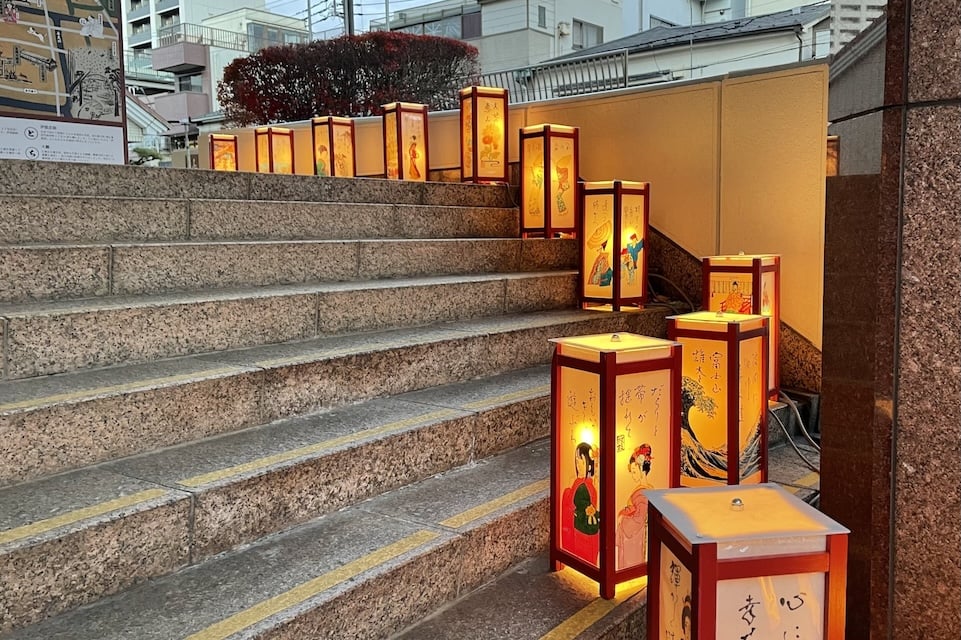
Edo-Tokyo Museum
A must-visit museum in Ryogoku showcasing Tokyo’s evolution from the Edo period to the modern day, featuring immersive life-sized exhibits.
- Walk across a replica of Nihonbashi Bridge and explore Edo-era streets
- Discover kabuki theater façades, merchant houses, and post-war exhibits
- Free multilingual volunteer guides for deeper cultural insight
Fukagawa Edo Museum
A hands-on hidden gem in Koto City that brings Edo-period Tokyo to life with full-scale recreations and interactive exhibits.
- Step inside authentic nagaya row houses, tea houses, and a canal boat
- Experience daily life with interactive props and immersive settings
- Lighting shifts every 15 minutes to simulate dawn, day, and night
Details: Edo-Tokyo Museum (江戸東京博物館, Edo-Tōkyō Hakubutsukan) & Fukagawa Edo Museum (深川江戸資料館, Fukagawa Edo Shiryōkan)
| Museum | Information |
| Edo-Tokyo Museum | Status: Closed for renovations until ~2026.Access: 5-min walk from Ryogoku Station (JR Sobu Line/Toei Oedo Line). Hours: 9:30–17:30 (Sat until 19:30). Closed Mondays. Admission: ~$4 (¥600 adults), ~$2 (¥300 students), kids under 15 free. Official Website: Edo-Tokyo Museum |
| Fukagawa Edo Museum | Access: 3-min walk from Kiyosumi-shirakawa Station (Exit A3). Hours: 9:30–17:00 (last entry 16:30). Closed 2nd & 4th Mondays and Dec 28–Jan 3. Admission: ~$2.70 (¥400 adults), ~$0.35 (¥50 children). |
Ryogoku Sumo Stadium and Sumo Museum

Visit the iconic Sumo Hall in Ryogoku, the beating heart of Japan’s national sport, where tradition, power, and ritual meet in unforgettable matches.
- Watch Grand Tournaments with rituals like dohyō-iri and salt throwing
- English audio guides provide real-time commentary for visitors
- Explore the free Sumo Museum with rotating exhibits and Yokozuna portraits
Details: Ryogoku Kokugikan (両国国技館) & Sumo Museum (相撲博物館)
| Item | Information |
| Access | 2-min walk from JR Ryogoku Station (West Exit); 5-min from Toei Oedo Line Ryogoku Station (Exit A3) |
| Grand Tournaments (Tokyo) | Jan 8–22, 2025; May 12–26, 2025; Sept 9–23, 2025 (approximate, varies yearly) |
| Tickets | Balcony seats ¥4,000 ($27), ringside higher; buy online via Sumo Association or agencies. Limited same-day unreserved seats sold at 7:45 AM at venue |
| Stadium Admission | Only ticket holders during tournaments. Entry hall & souvenir shop open weekdays |
| Sumo Museum Hours | Tue–Fri 10:00–16:30 (closed Sat–Mon & during tournaments). Admission free |
| Official Website | Japan Sumo Association |
Traditional Crafts and Workshops (Candy Art, Kappabashi Kitchenware Street)
Amezaiku (Candy Art) Workshop
Discover the Edo-period art of sculpting molten candy into lifelike animals and figures—a unique blend of craftsmanship, performance, and edible beauty.
- Watch artisans craft lifelike animals and characters in minutes
- Join a hands-on workshop to shape and paint your own creation
- Take home your amezaiku as a unique artistic souvenir
Kappabashi Kitchenware Street
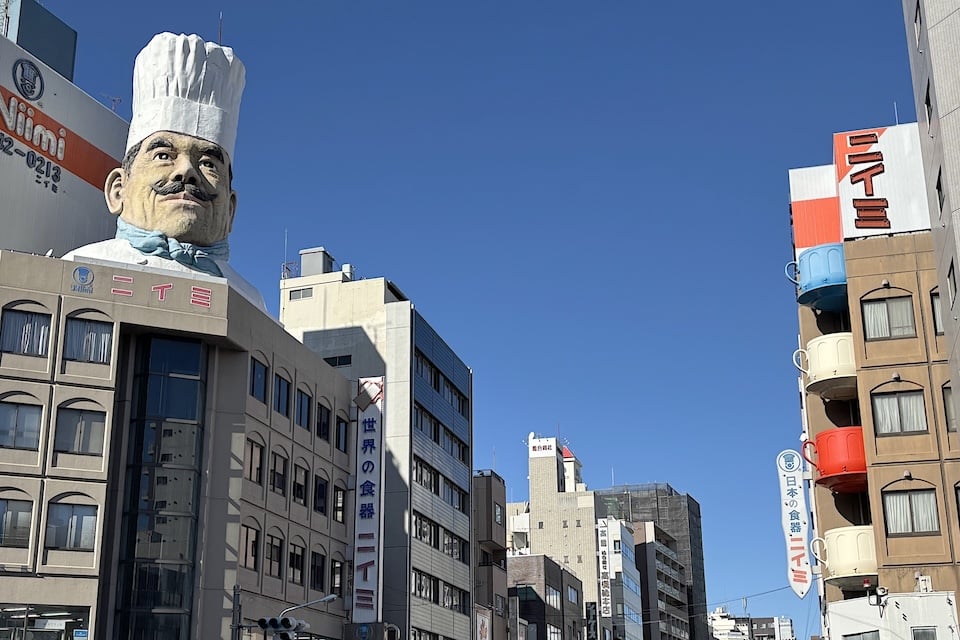
A culinary shopping paradise near Asakusa and Ueno, stretching 800 meters with over 100 shops—perfect for foodies, chefs, and curious travelers.
- Shop for Japanese knives, ceramics, chopsticks, and more
- Discover unique food samples (食品サンプル, shokuhin sample) and even join workshops
- Snap a photo at the giant chef head landmark at the entrance
Details: Amezaiku Candy Art & Kappabashi Dougu Street
| Item | Information |
| Ameshin (アメシン) Candy Art Studio | Access: 3-min from Tsukuba Express Asakusa Station, ~10-min from Ginza Line Asakusa Station Workshop: ~90 min sessions at 11:00, 14:00 daily Cost: ¥3,300 ($22) per person, reservation required Official Website |
| Kappabashi Dougu-gai (合羽橋道具街) | Access: 5-min walk from Tawaramachi Station (Ginza Line), 10-min from Asakusa Station Hours: Most shops 9:00–18:00, closed Sundays & public holidays Highlights: Knives (Kamata, Tsubaya), ceramics, food-sample shops with workshops (¥2,500) Payment: Mix of card and cash. Tax-free available (¥5,000+ with passport) Official Website |
Unique Things to Do in Tokyo
Been to Tokyo before? Or simply craving experiences that are a bit off the beaten path? This section is for you. Tokyo’s quirkiness and innovation shine through in these unique activities. From the heart of otaku culture in Akihabara’s maid cafés to mind-bending digital art installations and one-of-a-kind theme parks, these suggestions go beyond the typical tourist brochure.
They’re perfect if you want to see a different side of Tokyo that’s fun, weird, and memorable. Get ready to create stories you’ll be telling your friends back home for years!
Maid Cafés in Akihabara

Step into a playful slice of Japanese pop culture where frilly-costumed maids welcome you “home” and turn a meal into a quirky, theatrical experience.
- Be greeted with the iconic “Welcome home, Master/Milady!”
- Enjoy fun menus like omelet rice with cute ketchup art and parfaits
- Join in chants, watch performances, and take Polaroid photo souvenirs
Details: Maid Cafés (メイド喫茶) in Akihabara
| Item | Information |
| Notable Cafés | @Home Cafe (8F Don Quijote Akihabara, multiple floors), Maidreamin (flagship & branches), Pinafore, Cure Maid Cafe |
| Access | Akihabara Station (various lines). 5–10 min walk from Electric Town Exit. Flyers often handed out by maids on weekends |
| Hours | Typically 11:30–22:00; Maidreamin has late-night hours at some locations |
| Charges | Table charge ¥500–800 (~$3–5). Drinks ¥600–800, food ¥1,000+, desserts ¥800+. Polaroid with maid ~¥800–1,000 |
TeamLab Planets Tokyo(Toyosu)
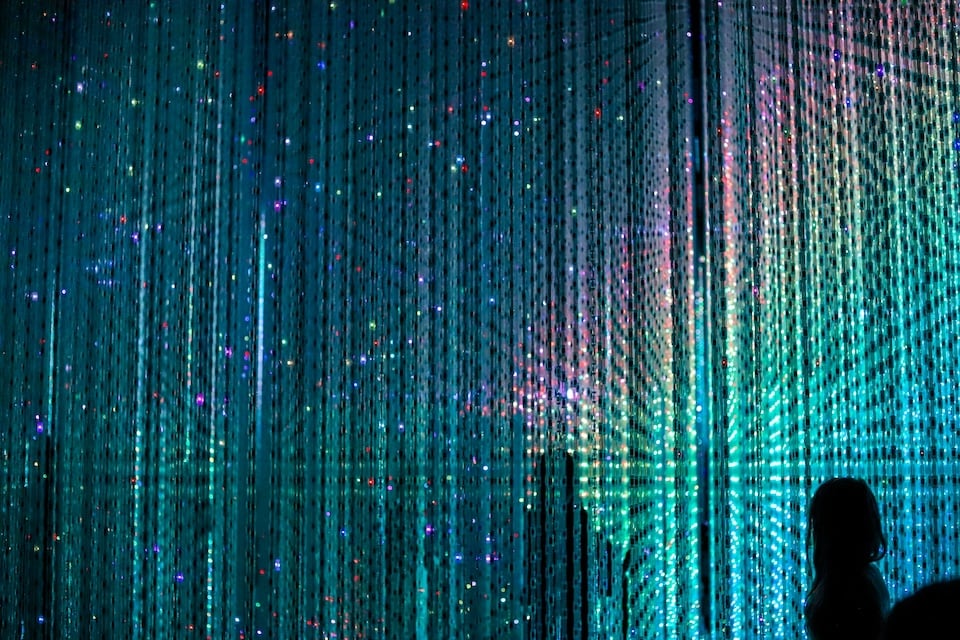
Dive into a digital art universe where you walk barefoot through water, mirrored rooms, and immersive installations that make you part of the artwork.
- Explore breathtaking installations like the Waterfall Room and Infinite Crystal Universe
- Walk barefoot through interactive spaces that blur reality and digital art
- A magical experience for couples, families, and solo travelers alike
Details: teamLab Planets TOKYO(チームラボプラネッツ 東京)
| Item | Information |
| Access | 1-min walk from Shin-Toyosu Station (Yurikamome). ~10-min walk from Toyosu Station (Yurakucho Line) |
| Hours | 9:00–22:00 (last entry 21:00). Open daily; hours vary by season/day |
| Admission | Adults ¥3,800 ($25), teens ¥2,300 ($15), kids ¥1,300 (~$9). Children 3 & under free. Prices vary by time/date |
| Official Website | TeamLab Tokyo |
Small Worlds Tokyo (Ariake)
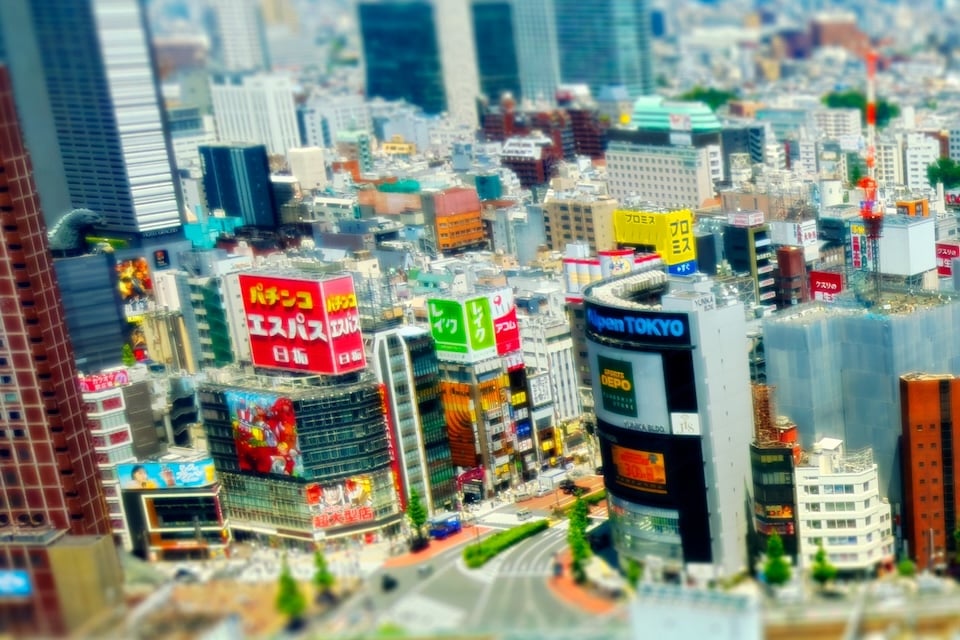
Step into a 1:80-scale miniature universe where rockets launch, anime worlds unfold, and tiny cityscapes come alive with dynamic day-night cycles.
- Watch dynamic dioramas like rocket launches, Sailor Moon, and Evangelion scenes
- Explore retro Showa-era streets and animated everyday Japan
- Create a 3D “Mini-Me” figure to place inside the miniature world for a year
Details: Small Worlds Tokyo(スモールワールズ東京)
| Item | Information |
| Access | 3-min walk from Ariake-Tennis-no-mori Station (Yurikamome), 9-min from Kokusai-Tenjijo Station (Rinkai Line) |
| Hours | 10:00–20:00 (last entry 19:30). Open daily (irregular closures possible) |
| Admission | Adults ¥2,700 ($18), Children 4–11 ¥1,900 ($13). Discounts for seniors/late entry. Annual passes available |
| Official Website | Small Worlds Tokyo |
Themed Cafés & Anime Attractions
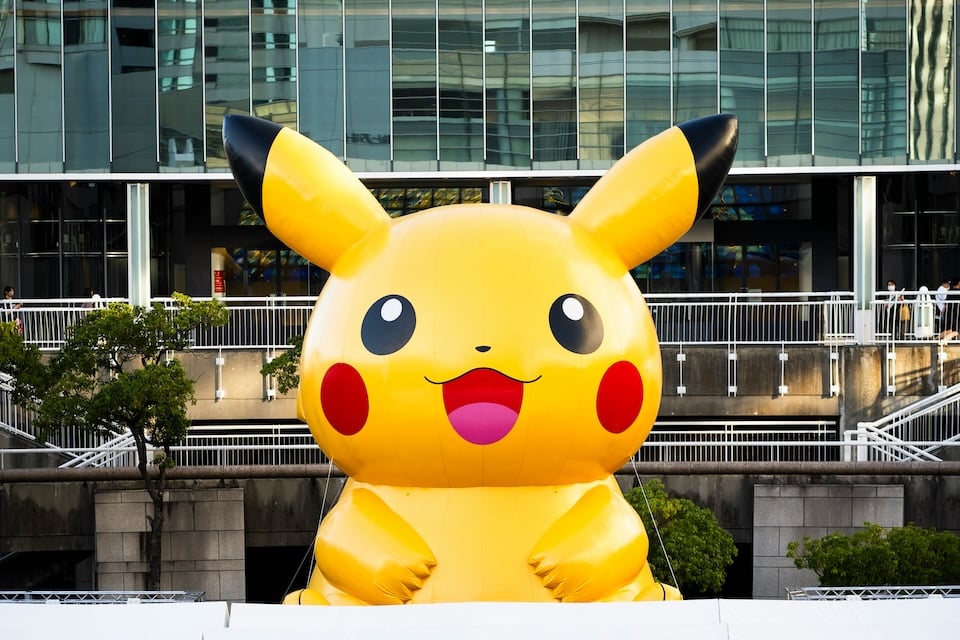
Character and Theme Cafés
Tokyo hosts a constantly changing lineup of cafés inspired by anime, games, and global pop culture—perfect for fans seeking immersive dining.
- Iconic spots like Pokémon Café (Nihonbashi) and Sanrio Café (Ginza)
- Seasonal pop-ups inspired by global hits like Harry Potter and Star Wars
- Instagrammable menus, exclusive merchandise, and advance reservations recommended
Anime and Pop Culture Attractions
From giant Pokémon to Studio Ghibli magic, Tokyo is a playground for anime fans and pop-culture lovers alike.
- Pokémon Center Mega Tokyo (Ikebukuro) – The ultimate Pokémon store with life-sized statues and exclusive goods
- Ghibli Museum (Mitaka) – Hayao Miyazaki’s enchanting museum with exclusive short films and Totoro-themed exhibits (advance tickets required)
- Akihabara – Tokyo’s anime mecca with specialty shops, arcades, and otaku culture hotspots
Details: Themed Cafés & Anime Attractions
| Attraction | Information |
| Pokémon Café | Nihonbashi, 5F Takashimaya East Bldg. Reservation only (1 month ahead). Adjacent Pokémon Center DX store (no reservation needed). Official Website |
| Gundam Factory Yokohama | Moving life-size Gundam + themed café (open until Mar 2024). In Odaiba, Unicorn Gundam statue at DiverCity Plaza (free, with night light shows). Official Website |
| Sanrio Café | Ginza. Walk-ins usually okay. My Melody Café in Ikebukuro also available. Official Website |
| Ghibli Museum (三鷹の森ジブリ美術館) | Mitaka, 15-min walk or bus from JR Mitaka Station. Tickets (¥1,000) must be purchased in advance. No photography inside. Official Website |
| Idol/Anime Shows | Venues: Zepp Tokyo, Budokan, small Akihabara theaters. Glowstick-filled J-pop culture experience. |
Tokyo Rainy Day Activities
Caught in the rain? No problem! Tokyo never runs out of indoor fun. Some experiences are even better with raindrops outside, giving you the perfect excuse to explore shopping malls, museums, and lively entertainment under one roof.
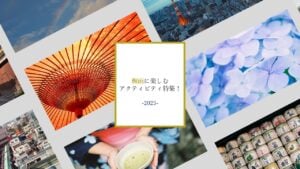
Shopping at Ginza, Omotesando Hills, and Akihabara Yodobashi
- Ginza: Explore Mitsukoshi’s legendary depachika food hall, Wako’s luxury clock tower, Itoya’s 12-floor stationery paradise, and MUJI Ginza flagship with bakery and hotel lobby.
- Omotesando Hills: Designed by Tadao Ando, featuring boutiques and stylish cafés, plus nearby malls like Gyre (Eva Store) and Tokyu Plaza with its famous mirrored escalator entrance.
- Akihabara Yodobashi: Nine floors packed with electronics, gadgets, toys, and hobby shops, plus rooftop batting cages and simulators for fun beyond shopping.
Details: Ginza, Omotesando & Akiba Indoor Shopping
| Spot | Information |
| Itoya (銀座伊東屋) | 2-7-15 Ginza, Hours 10:00–20:00 (Sun until 19:00). Postcard service available. Official Website |
| Mitsukoshi Ginza | 4-6-16 Ginza, Hours 10:00–20:00. Depachika food hall + exhibitions. Official Website |
| Omotesando Hills | 4-12-10 Jingumae, Hours 11:00–21:00 (restaurants until 23:00). Free Wi-Fi. Official Website |
| Yodobashi-Akiba | 1-1 Kanda Hanaokacho, Chiyoda. Hours 9:30–22:00 (restaurants until 23:00). Tax-free, English guides available. Official Website ※Japanese Only |
Tokyo International Forum & KITTE Garden
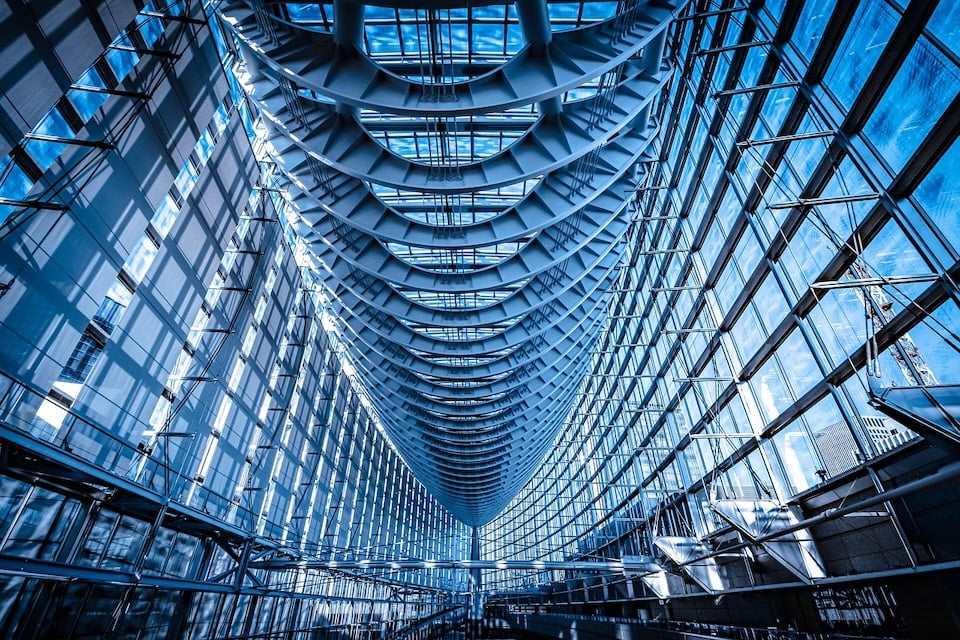
- Tokyo International Forum: A striking ship-hull shaped glass atrium in Marunouchi, featuring free exhibits, local markets, and photo-worthy architecture.
- KITTE Marunouchi: A stylish shopping and dining mall with the 6th-floor KITTE Garden rooftop overlooking Tokyo Station, plus the Intermediatheque science museum inside.
Details: Tokyo International Forum & KITTE
| Spot | Information |
| Tokyo International Forum (東京国際フォーラム) | 3-5-1 Marunouchi, Chiyoda. Hours 7:00–23:30. Free entry. Connected to Tokyo & Yurakucho stations. Official Website |
| KITTE Marunouchi | 2-7-2 Marunouchi. Shops 11:00–20:00 (Fri/Sat until 21:00). Restaurants until 23:00. Official Website |
| Intermediatheque Museum | KITTE 2F/3F, Hours 11:00–18:00 (closed Mon). Free entry. Official Website |
Aquariums and Indoor Parks (Maxell Aqua Park Shinagawa)
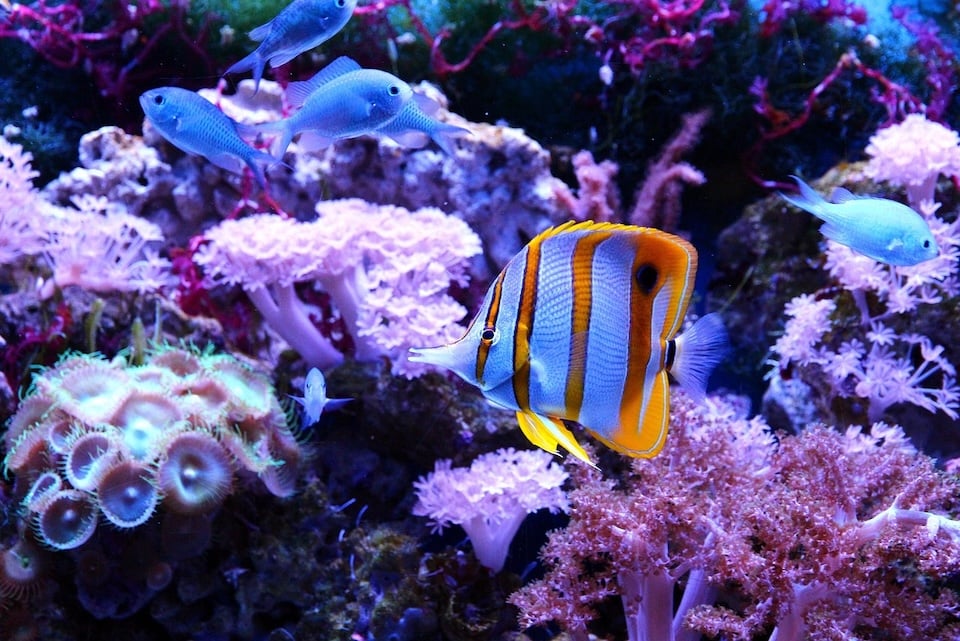
- Maxell Aqua Park Shinagawa: A digital-art infused aquarium inside Shinagawa Prince Hotel, featuring dolphin shows, jellyfish displays, and interactive rides.
- Other Aquariums: Sunshine Aquarium (Ikebukuro) and Sumida Aquarium (Tokyo Skytree) offer family-friendly indoor marine experiences.
- Indoor Parks: Joypolis (Odaiba VR amusement park), Namja Town (Ikebukuro), and VenusFort Odaiba provide rainy-day fun with themed attractions and food.
Details: Maxell Aqua Park Shinagawa & Others
| Spot | Information |
| Maxell Aqua Park Shinagawa | 4-10-30 Takanawa, Minato. Hours 10:00–20:00. Admission ¥2,500 adult ($17), ¥1,300 child ($9). Inside Shinagawa Prince Hotel. Official Website |
| Sunshine Aquarium | Sunshine City, Ikebukuro. Hours 10:00–18:00. Admission ¥2,400 (~$16). Rooftop but mostly indoors. Official Website |
| Sumida Aquarium | Solamachi Mall, Tokyo Skytree. Hours 10:00–21:00. Admission ¥2,300 (~$15). Notable jellyfish lab. Official Website |
| Joypolis | Decks Tokyo Beach, Odaiba. Hours 11:00–21:00. Admission + unlimited rides ¥4,500 ($31). Official Website |
Museums and Galleries (Nezu Museum, Tokyo Station Gallery, Museum of Contemporary Art)
Nezu Museum
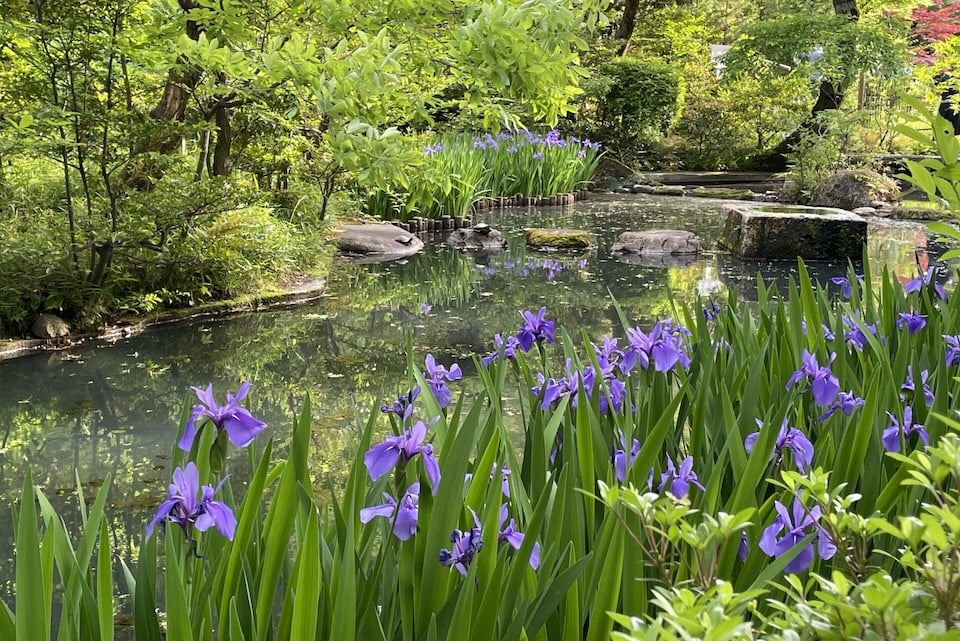
A tranquil museum in Aoyama, the Nezu Museum showcases Japanese and East Asian pre-modern art, set amid one of Tokyo’s most beautiful gardens.
- Masterpieces from the Nezu family collection, including Buddhist statues, scrolls, and tea utensils
- Stunning traditional garden with ponds, stone lanterns, and seasonal beauty
- Elegant bamboo-lined approach, especially atmospheric on rainy days
Details: Nezu Museum(根津美術館)
| Spot | Information |
| Access | 8-min walk from Omotesando Station Exit A5 |
| Hours | 10:00–17:00 (last entry 16:30). Closed Mondays |
| Admission | ¥1,300 adults ($9) |
| Official Website | Nezu Museum |
Tokyo Station Gallery
Housed in the Marunouchi North Dome of Tokyo Station, this boutique museum blends historic architecture with contemporary art exhibitions, offering a refined cultural stop in the heart of the city.
- Eclectic rotating exhibitions of modern art, design, and architecture
- Retro-industrial interior with exposed brick and ironwork from 1914
- Convenient location inside Tokyo Station—perfect for a quick rainy-day visit
Details: Tokyo Station Gallery(東京ステーションギャラリー)
| Spot | Information |
| Access | Near Marunouchi North Exit ticket gates |
| Hours | 10:00–18:00 (Fri until 20:00). Closed Mondays |
| Admission | ¥1,200 adults ($8) |
| Official Website | Tokyo Station Gallery |
Museum of Contemporary Art Tokyo (MOT)
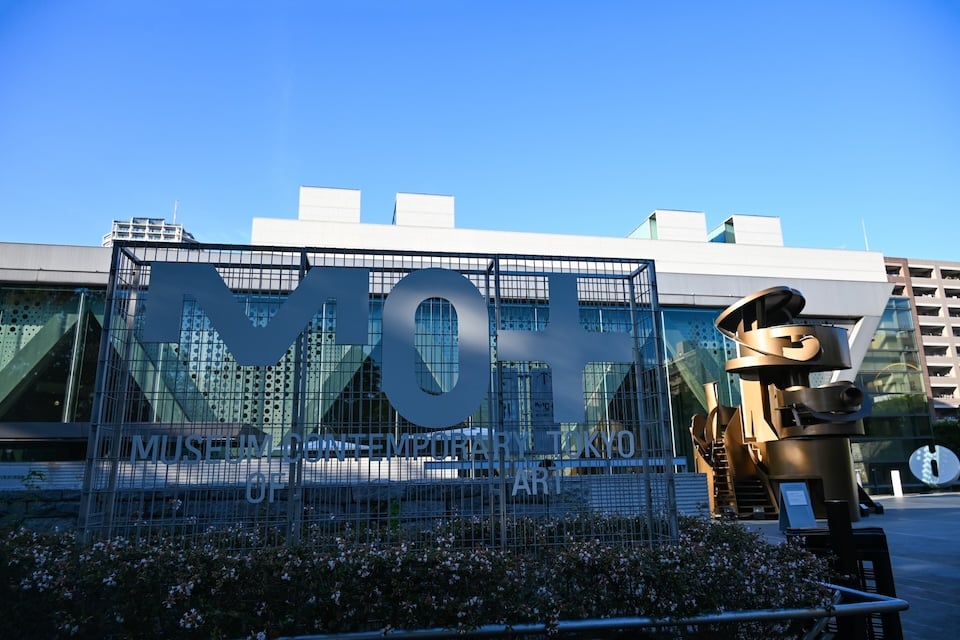
Located in Kiba, MOT is a premier destination for modern and contemporary art, showcasing both international exhibitions and a notable permanent collection. Its spacious, light-filled galleries make it a calm retreat, especially on rainy days.
- Cutting-edge rotating exhibitions featuring global and Japanese artists
- Strong permanent collection spanning postwar to contemporary works
- Spacious, airy architecture offering a serene atmosphere for reflection
Details: Museum of Contemporary Art Tokyo (MOT)(東京都現代美術館)
| Spot | Information |
| Access | 9-min walk from Kiyosumi-Shirakawa Station Exit B2 |
| Hours | 10:00–18:00 (last entry 17:30). Closed Mondays |
| Admission | Permanent collection ¥500 ($3.50), special exhibits ¥1,200–¥2,000 ($8–$14) |
| Official Website | Museum of Contemporary Art Tokyo |
Karaoke & Gaming at Taito Station Shibuya
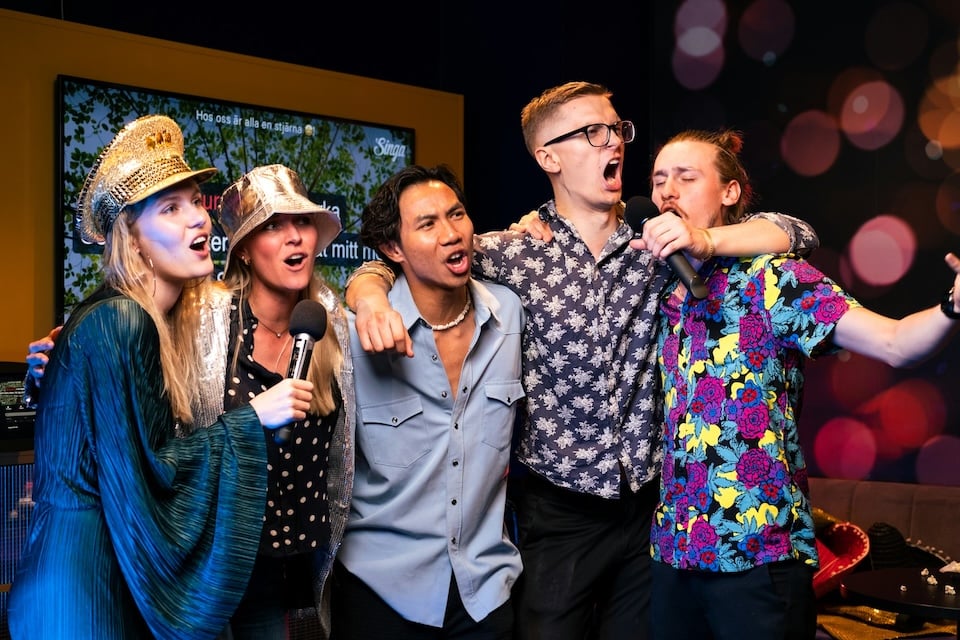
Taito Station Shibuya
Taito Station Shibuya is a multi-floor arcade packed with entertainment, from UFO catchers and rhythm games like Taiko no Tatsujin to fighting games, racing simulators, and purikura photo booths. A lively indoor escape during rainy days.
Details: Taito Station Shibuya(タイトーステーション渋谷)
| Spot | Information |
| Access | 2-min walk from Shibuya Station East Exit |
| Hours | 10:00–24:00 (later on weekends) |
| Cost | Most games ¥100–¥200 (~$0.70–$1.40). Purikura ¥400 ($3) |
| Official Websaite | Taito Station Shibuya ※Japanese Only |
Karaoke-kan Shibuya
A classic karaoke chain featured in Lost in Translation, offering private rooms with English song libraries, food and drink service, and even themed party rooms. A perfect rainy-night bonding experience.
Details: Karaoke-kan Shibuya(カラオケ館 渋谷)
| Spot | Information |
| Access | 1-min walk from Shibuya Station Hachiko Exit |
| Hours | 9:00–5:00 (next morning). Some branches open 24h on weekends |
| Cost | Daytime ¥140/30min ($1), Nighttime ¥380/30min ($2.70). Average 2h night ¥2,000–3,000 ($14–$21) |
| Official Website | Karaoke-kan |
Tokyo Short Trip Spots for Busy Schedules
Only have a little free time between meetings or during a layover? Tokyo offers plenty of short yet fulfilling stops. These spots can be enjoyed in under one to two hours, giving you a taste of Japanese culture and nature without needing a full day. Perfect for business travelers or anyone with a packed itinerary.
Shinjuku Gyoen National Garden
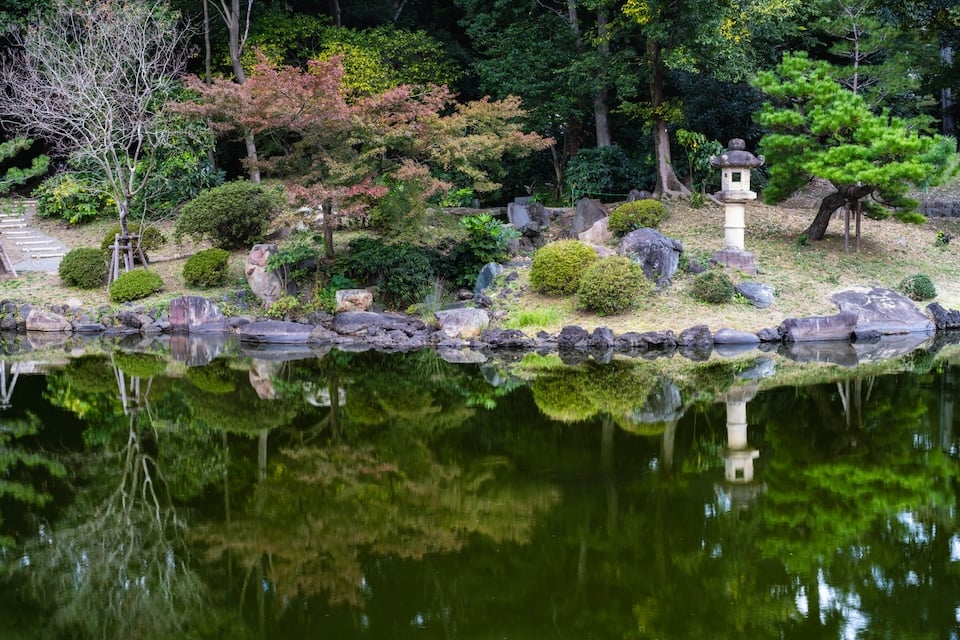
An elegant urban oasis blending Japanese, French, and English-style landscapes—perfect for a peaceful break from Shinjuku’s bustle.
- Traditional gardens, French formal rows, and an open English lawn
- Seasonal highlights like spring cherry blossoms and autumn foliage
- Iconic Kyu Goryotei Pavilion, a Chinese-style structure in the Japanese garden
Details: Shinjuku Gyoen (新宿御苑)
| Spot | Information |
| Access | Shinjuku Gate: 10 min walk from JR Shinjuku Station / 5 min from Shinjuku-gyoemmae Station.Okido Gate: 5 min from Shinjuku-gyoemmae Station Exit 2.Sendagaya Gate: 5 min from JR Sendagaya Station. |
| Hours | 9:00–16:30 (last entry 16:00). Closed Mondays (or Tue if Mon holiday). Open daily during cherry blossom season. Closed Dec 29–Jan 3. |
| Admission | Adults ¥500 ($3.50), Students ¥250 ($1.70), Kids free |
Hamarikyu Gardens
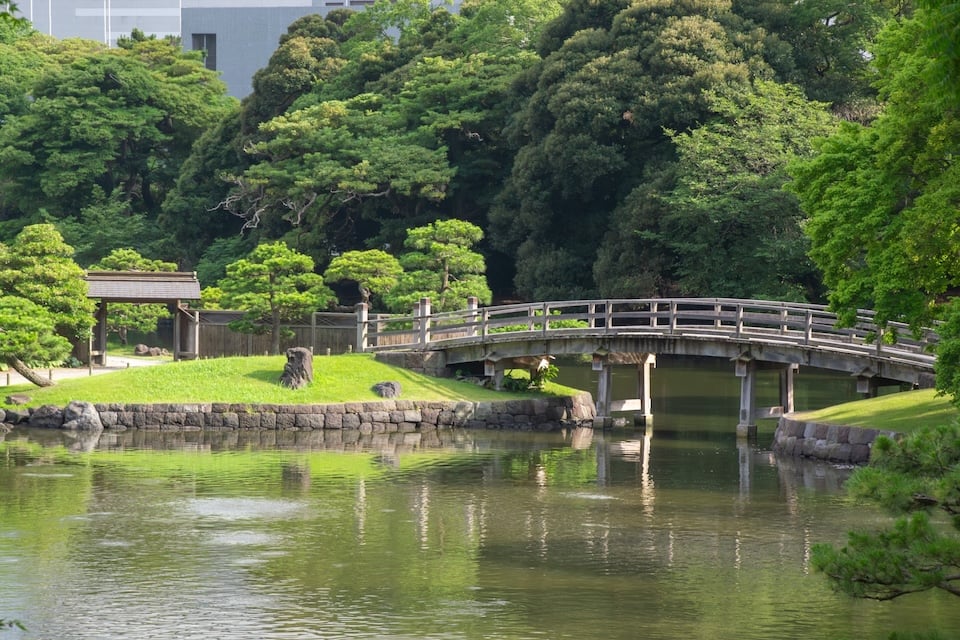
A serene Edo-period garden by Tokyo Bay, blending ==historic teahouses, tidal ponds, and ancient pines== with a backdrop of modern skyscrapers.
- Tidal Pond uniquely connected to Tokyo Bay
- Nakajima Teahouse for matcha and sweets with water views
- 300-Year-Old Pine Tree, a living Edo-era treasure
Details: Hamarikyu Gardens(浜離宮恩賜庭園)
| Spot | Information |
| Access | 7 min from Shiodome Station Exit 10. 10 min from Tsukijishijo or Tsukiji Station. 15 min from JR Shimbashi Station. Also accessible via Tokyo Water Bus (from Asakusa). |
| Hours | 9:00–17:00 (last entry 16:30). Closed Dec 29–Jan 1. |
| Admission | ¥300 (~$2) adults |
| Official Website | Hamarikyu Gardens |
Hibiya Park
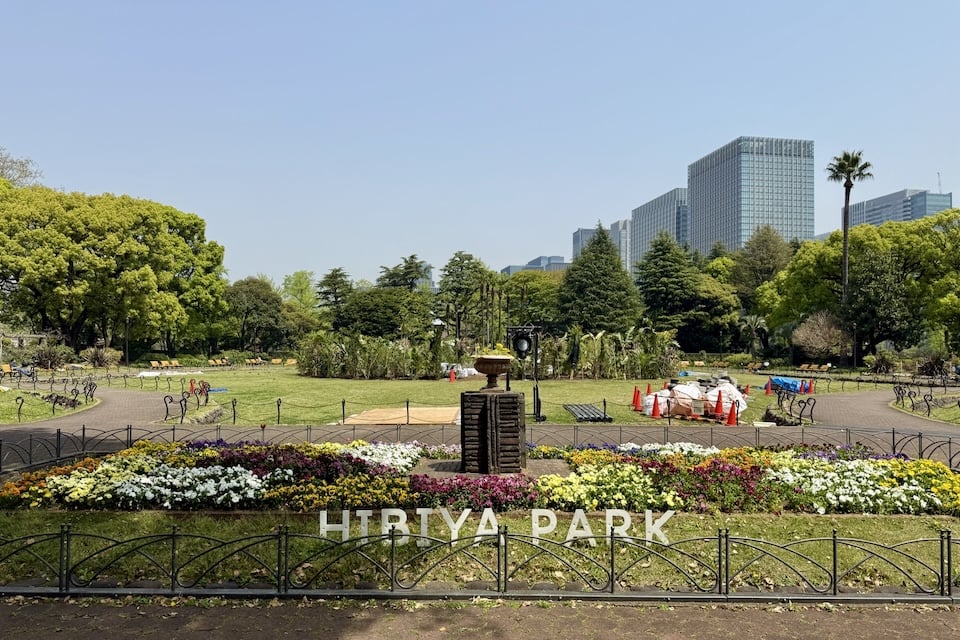
Japan’s first Western-style urban park, located near the Imperial Palace. A relaxing green escape with fountains, flowers, and a touch of history—ideal for a 15–30 minute stroll.
- Central Fountain, beautifully illuminated at night
- Seasonal Flowers like roses, tulips, and chrysanthemums
- Matsumotoro Restaurant, a historic dining spot since 1903
Details: Hibiya Park (日比谷公園)
| Spot | Information |
| Access | Next to Hibiya Station Exits A10/11. 5 min from Kasumigaseki or Uchisaiwaicho Stations. 8 min from JR Yurakucho Station. |
| Hours | Open 24 hours |
| Admission | Free |
| Official Website | Hibiya Park |
Marunouchi Nakadori and Yurakucho Izakaya Streets
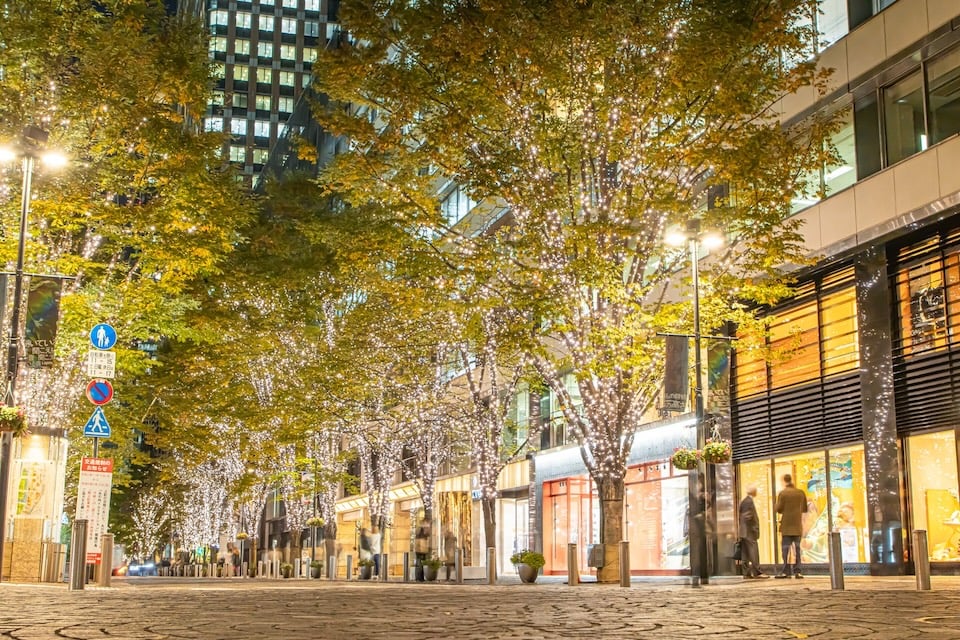
Marunouchi Nakadori
A chic, tree-lined avenue between Tokyo Station and the Imperial Palace, often called the “Champs-Élysées of Tokyo.” Upscale boutiques, cafés, and seasonal art installations create a refined yet relaxed atmosphere.
- Upscale Boutiques & Cafés: International brands, Japanese designers, and stylish coffee spots
- Seasonal Beauty: Cherry blossoms in spring and LED illuminations in winter
- Pedestrian Paradise: Traffic-free weekends perfect for relaxed strolls
Details: Marunouchi Nakadori (丸の内仲通り)
| Spot | Information |
| Access | 1 min from Tokyo Station (Marunouchi South Exit). 3 min from Yurakucho Station. Near Nijubashi-mae Station (Chiyoda Line). |
| Hours | Street open 24/7. Shops: 11:00–20:00. Weekends/Holidays: 12:00–17:00 pedestrian zone. |
| Official Website | Marunouchi Nakadori |
Yurakucho Izakaya Alleys
Just south of Marunouchi, these nostalgic alleys under the JR tracks offer smoky Showa-era charm with red lanterns and sizzling yakitori—a lively contrast to Marunouchi’s polish.
- Retro Vibe: Lantern-lit alleys with a nostalgic Showa-era charm
- Yakitori & Drinks: Quick skewers and cold beer in a lively setting
- Tourist-Friendly: English and picture menus make ordering easy
Details: Yurakucho Izakaya Alleys (有楽町居酒屋横丁)
| Spot | Information |
| Access | From Yurakucho Station Ginza Exit, izakayas are immediately visible. For Gado-shita, walk under tracks along Harumi-dori. |
| Hours | Most open from ~17:00 until midnight (some close earlier). Lunch sets available at select shops. |
| Peak Times | 18:00–21:00 weekdays. Quieter in daytime. |
| Official Website | Yokocho Lover ※Japanese only |
Tokyo Metropolitan Government Building Observation Deck
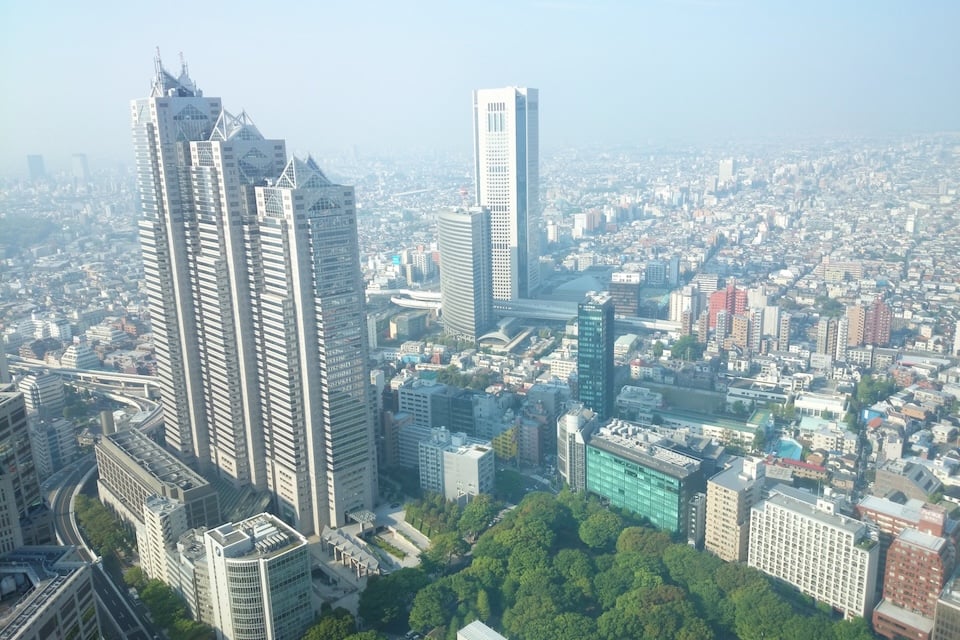
Twin towers in Shinjuku offering free 45th-floor observatories (~663 ft / 202 m). A ==quick, no-cost way to enjoy sweeping views of Tokyo’s skyline==.
✅ Free Entry: Enjoy panoramic city views without a ticket
✅ Panoramic Views: Spot Tokyo Tower, Meiji Shrine, and Mt. Fuji on clear days
✅ Quick Visit: 20–30 minutes is perfect for sunset or night lights
Details: Tokyo Metropolitan Government Building Observation Deck (東京都庁展望室)
| Spot | Information |
| Access | Direct from Tocho-mae Station (Oedo Line). 10 min walk from JR Shinjuku Station West Exit. |
| Hours | North Deck: 9:30–22:00 (last entry 21:30).South Deck: 9:30–17:30 (extended to 22:00 when North closed). |
| Admission | Free. Bag security check required. |
| Official Website | Tokyo Metoropolitan Government |
Quick River Cruise on the Sumida River
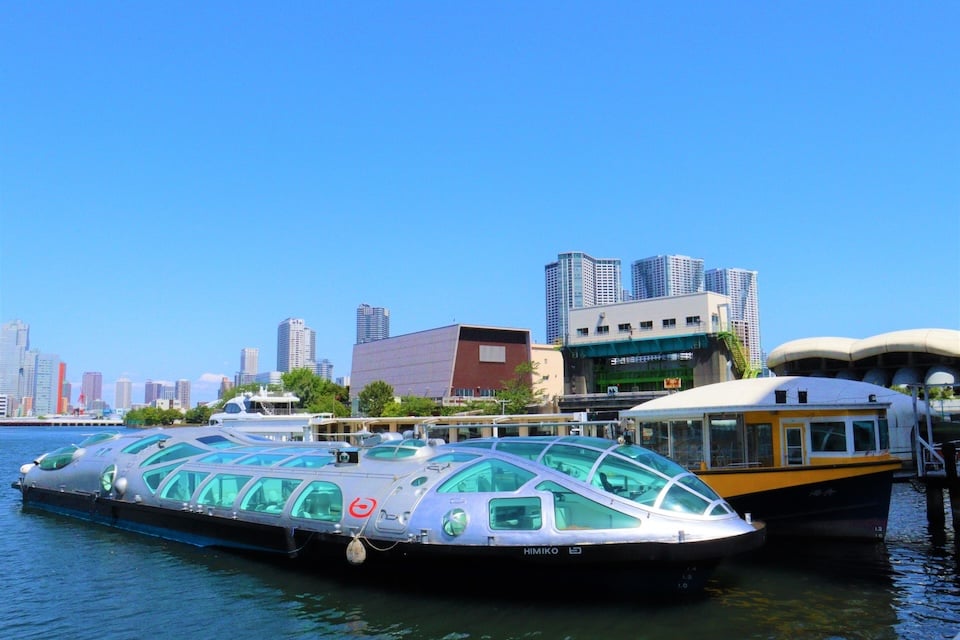
A short river cruise doubles as sightseeing and transport, linking Asakusa with Hamarikyu, Hinode, or Odaiba. Glide under iconic bridges, spot Tokyo Skytree, and enjoy Tokyo’s waterfront in under an hour.
- Scenic Route: Cruise under bridges with Skytree and city views
- Pop Culture Touch: Ride futuristic boats designed by anime legend Leiji Matsumoto
- Convenient Access: Connects Asakusa, Odaiba, and Hamarikyu Gardens efficiently
Details: Sumida River Cruise (Tokyo Cruise / Water Bus) (隅田川, Sumida-gawa)
| Spot | Information |
| Piers | Asakusa (near Azuma-bashi bridge), Hamarikyu (inside gardens), Hinode (near Hamamatsucho), Odaiba Seaside Park |
| Schedule | Approx. every 30–60 min. Asakusa–Hinode: hourly. Hamarikyu: 4–5 boats/day. |
| Cost | Asakusa–Hinode: ¥740 ($5). Asakusa–Hamarikyu: ¥1,120 ($8, includes entry). Asakusa–Odaiba: ¥1,280 (~$9). Children half-price. |
| Official Website | Sumida River Cruise |
Luxury Experiences in Tokyo
Tokyo offers world-class luxury experiences, from Michelin-starred dining to refined cultural indulgence. Among them, kaiseki and Edomae sushi dining stand out as iconic high-end journeys for the senses.
Kaiseki Dining at Ginza Kyubey

One of Tokyo’s most celebrated sushi restaurants, Kyubey blends Edomae tradition with refined omotenashi. Founded in 1935, it has welcomed world leaders and celebrities. Dining here means sitting at the counter, watching master chefs craft each seasonal piece with artistry.
- Signature Sushi: Highlights include toro, kohada, kuruma-ebi, and delicate tamago
- Atmosphere: Intimate counter seating with personalized service
- Reservations Essential: Often secured through hotel concierge
Details: Ginza Kyubey (銀座 久兵衛)
| Spot | Information |
| Access | 5 min walk from Shimbashi Station (JR Ginza Exit), 7 min walk from Shimbashi Metro Station |
| Hours | Lunch: 11:30–14:00. Dinner: 17:00–22:00. Closed during New Year holidays and some Sundays. |
| Budget | Lunch omakase: from ¥8,000 ($55). Dinner omakase: ¥30,000–¥40,000+ ($200–$270). Drinks extra. |
| Official Website | Ginza Kyubey |
VIP Tea Houses and Private Garden Experiences
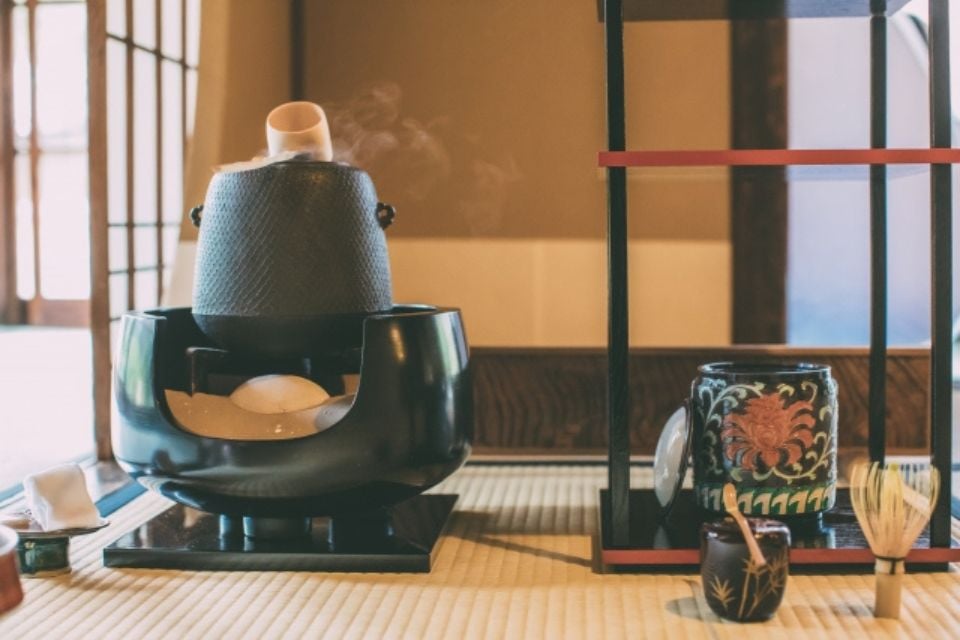
Private tea ceremonies and garden dinners in Tokyo redefine exclusivity. With MOTENAS JAPAN or luxury concierges, guests can enjoy intimate cultural immersions—where privacy and personalization transform tradition into unforgettable VIP encounters.
✅ Tea Ceremony & Calligraphy: Private sessions with masters for an intimate cultural experience
✅ Garden Dining: Seasonal kaiseki in exclusive historic gardens
✅ Geisha Entertainment: Traditional dance and shamisen music in private venues
Details: VIP Tea House & Garden Experiences
| Spot | Information |
| Happo-en (八芳園) | Luxury garden venue in Shirokanedai, with historic tea houses available for private ceremonies. Packages include kimono, tea, and garden strolls. Official Website |
| Hotel Chinzanso Villa (ホテル椿山荘 庭園茶室「残月」) | Historic tea house for private ceremonies or dinners. Official Website |
| Geisha Entertainment | Arranged via ryotei in Kagurazaka, Shinbashi, or Asakusa. Includes private meals, geisha dance, and shamisen music. |
| Booking Channels | Typically via hotel concierge, MOTENAS JAPAN, or luxury travel designers. |
| Cost Range | Tea ceremonies: $500–$1,000 for 2–4 guests. Private dinners: $300–$500 per person. Geisha evenings: ¥100,000+ (~$700) plus meal. |
Stay at The Ritz-Carlton or Park Hyatt Tokyo
Tokyo’s most iconic luxury hotels deliver more than comfort—they create once-in-a-lifetime moments. From panoramic skyline views to Michelin-starred dining, both properties define world-class hospitality.
- The Ritz-Carlton Tokyo – Sky-high rooms above the 45th floor, Michelin-star dining at Azure 45, and a world-class spa.
- Park Hyatt Tokyo – Iconic from Lost in Translation, featuring the legendary New York Grill & Bar with live jazz.
- Unparalleled Views & Service – Panoramic Mt. Fuji and Tokyo Tower vistas paired with personalized, discreet hospitality.
Details: Ritz-Carlton Tokyo & Park Hyatt Tokyo
| Hotel | Information |
| The Ritz-Carlton Tokyo | Location: Roppongi Midtown Tower (45F–53F), direct access to Roppongi Station Rooms: 245 in total Rates: From ~¥60,000 ($400) per night; suites up to ¥300,000+ ($2,000) Official Website |
| Park Hyatt Tokyo | Location: Shinjuku Park Tower (39F–52F), 15-min walk or free shuttle from Shinjuku Station Rooms: 177 in total Rates: From ~¥50,000 ($330) per night; suites significantly higher Official Website ※Reopening planned for fall 2025 |
Exclusive Kabuki or Noh Private Performances
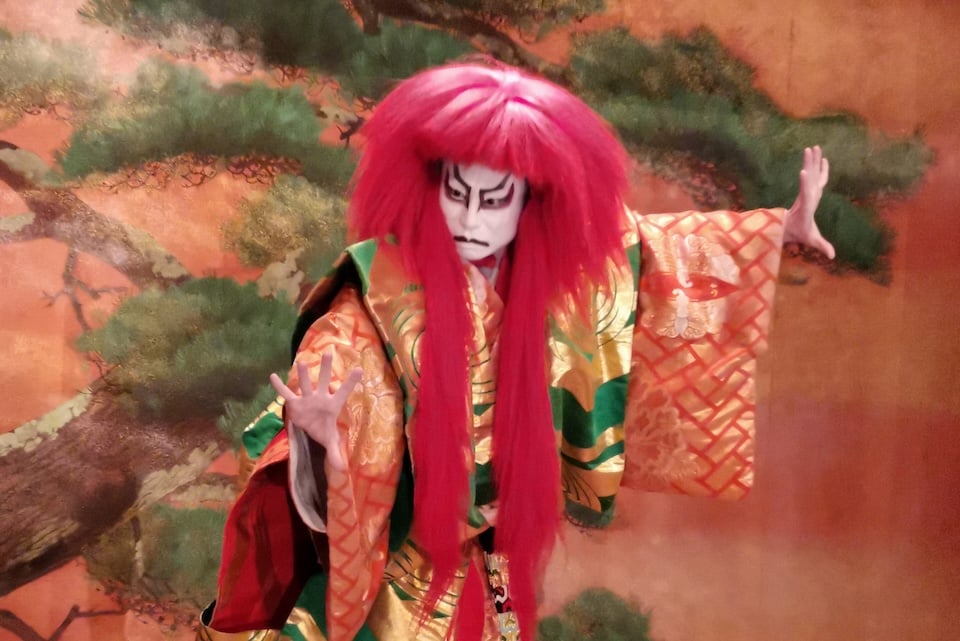
Experience Japan’s traditional arts in a way few can—through a private Kabuki or Noh performance. Whether in a temple garden, historic theater, or hotel ballroom, these intimate productions bring classical Japanese drama directly to VIP audiences.
✅ Kabuki & Noh: Classical Japanese theater with stunning costumes, masks, and live music
✅ Venues: Exclusive settings like temples, gardens, or luxury hotels
✅ VIP Access: English support, intimate audiences, and post-show meet-and-greets
Details: Private Traditional Performances
| Category | Information |
| Kabuki | Private shows arranged via Shochiku or cultural producers. Performances may include highlights from Shibaraku or Renjishi. Costumes, live shamisen, and explanatory guides provided. |
| Noh / Kyogen | Troupes perform at venues like Cerulean Tower Noh Theatre or outdoors in temple gardens. Kyogen (comic relief plays) add accessibility. |
| Cost | From semi-private demonstrations (~a few thousand dollars) to full productions with top actors ($50,000+). |
Gourmet Pairings and Fine Dining in Michelin-Starred Restaurants
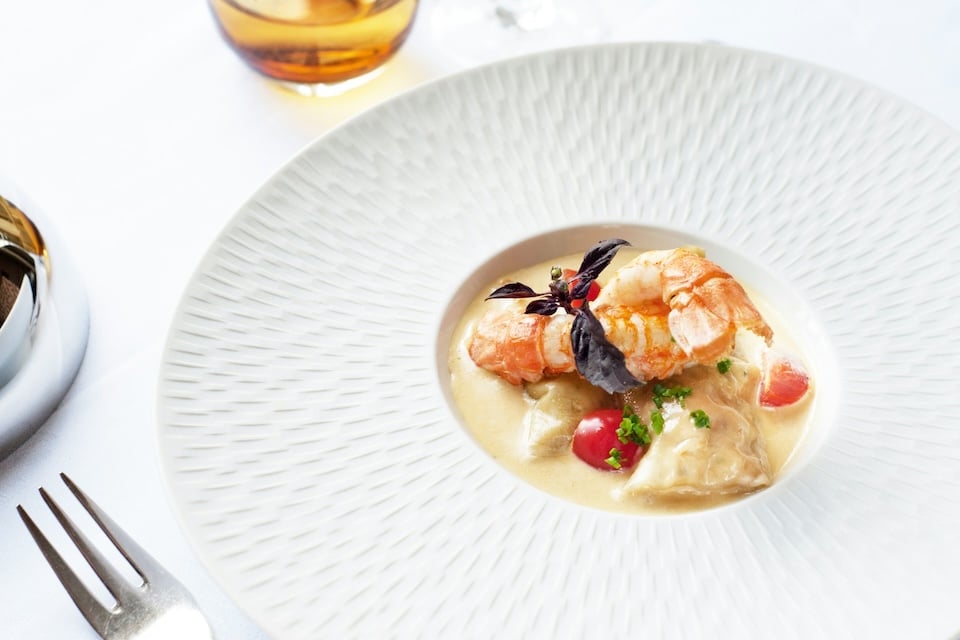
Tokyo, the Michelin capital of the world with over 230 starred restaurants, is a paradise for luxury travelers. From sushi with sake flights to kaiseki paired with fine wines, dining here is both art and performance, guided by master chefs and sommeliers.
✅ World-Leading Scene: Over 230 Michelin-starred restaurants, the most in the world
✅ Sushi & Kaiseki: Seasonal multi-course menus with curated sake or wine pairings
✅ Exclusivity: Private chef’s tables and bespoke dining experiences
Details: Michelin Fine Dining & Pairings in Tokyo
| Restaurant | Information |
| Narisawa (成澤) | Minato-ku, 2 Michelin stars, World’s 50 Best. Known for Satoyama cuisine. Wine pairing ~¥20,000 ($135). Signature dish: Bread of the Forest. Official Websaite |
| Den (傳) | Jingumae, 2 stars, World’s #1 (2023). Playful modern kaiseki. Pairings ¥10,000–15,000 ($70–100). Chef Zaiyu Hasegawa greets guests personally. Official Websaite |
| Ryugin (龍吟) | Hibiya, 2 stars. Modern kaiseki with seasonal focus. Wine/sake pairing ~¥15,000 ($100). Chef is a champagne enthusiast. Official Website |
| L’Effervescence | Nishi-Azabu, 3 stars. French-Japanese cuisine. Offers unique non-alcoholic pairings (tea, infusions). Official Website |
| Sukiyabashi Jiro (すきやばし次郎) | Ginza, 2 stars. Fast-paced sushi omakase (15–20 min). No pairings offered—focus is solely on sushi. Official Website |
Tailor-Made Hospitality: Custom Experiences for VIP Guests

When standard itineraries fall short, Tokyo’s bespoke hospitality steps in. Services like MOTENAS JAPAN and five-star hotel concierges curate tailor-made experiences that immerse VIP guests in Japanese culture on an intimate level.
These go beyond simple bookings, offering cultural performances, private access, and deep personalization.


Private Noh & Kabuki Performances
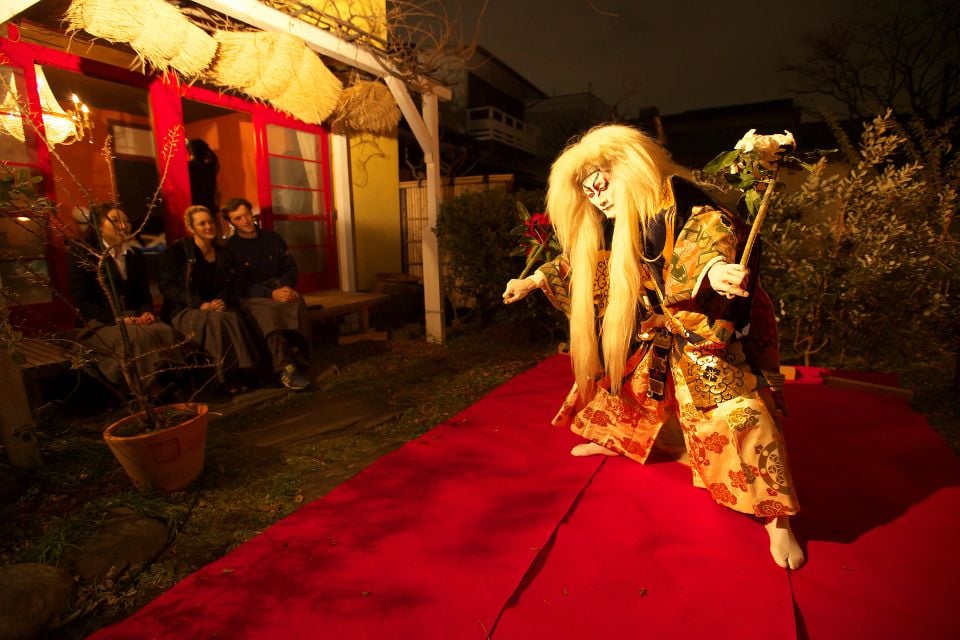
For VIP travelers seeking Japan’s most refined performing arts, a private Noh or Kabuki performance offers an intimate window into centuries of tradition. Staged in shrines, gardens, or exclusive theaters, the atmosphere is dramatic yet serene, making the experience deeply memorable.
What sets these events apart is the personalization. Before the show, experts may explain the story and symbolism, helping even first-time viewers connect. Afterward, guests often meet the actors, see masks or costumes up close, and hear insights directly from performers.
A Kabuki demonstration might show the transformation of an onnagata applying makeup and kimono before performing a graceful dance. Noh, with its slow rhythm and candlelit setting, becomes hauntingly powerful in such proximity. More than a performance, it is an exchange—exclusive, immersive, and profoundly moving.
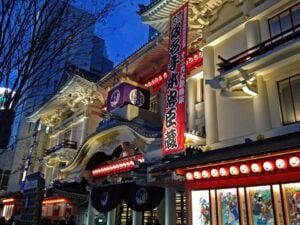

Personalized Tea Ceremony & Calligraphy
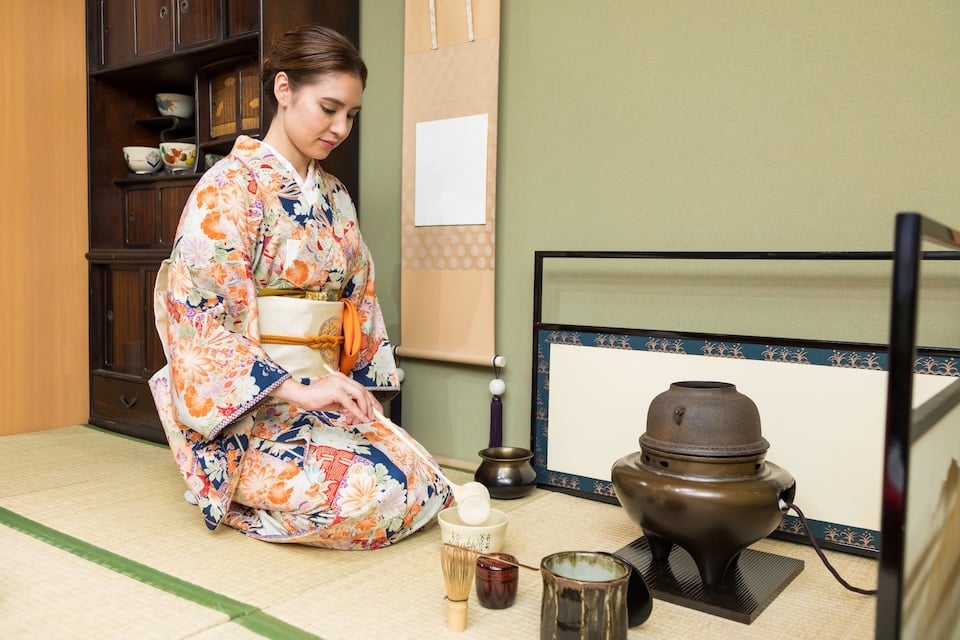
A private tea ceremony or calligraphy lesson offers cultural depth and exclusivity far beyond tourist experiences. VIP guests can enjoy a one-on-one tea ritual in a historic teahouse or luxury hotel suite, often with a chakaiseki meal, multiple rounds of matcha, and the chance to handle antique utensils rarely shown to outsiders. Add-ons such as kōdō (incense ceremony), ikebana, or kimono dressing create a holistic immersion.
A private calligraphy session with a renowned shodō master adds another dimension. After watching bold brushwork performed as art, guests receive personal guidance to write their own kanji on fine washi paper, sometimes leaving with scrolls or engraved inkstones as keepsakes.
Tailored to each guest’s schedule and interests—whether in a samurai museum after-hours, a garden pavilion, or a hotel suite—these experiences combine tranquility and artistry. Together, tea and calligraphy are among Tokyo’s most refined cultural offerings, capturing the essence of Japanese aesthetics.

Exclusive Kaiseki Pairing Experiences
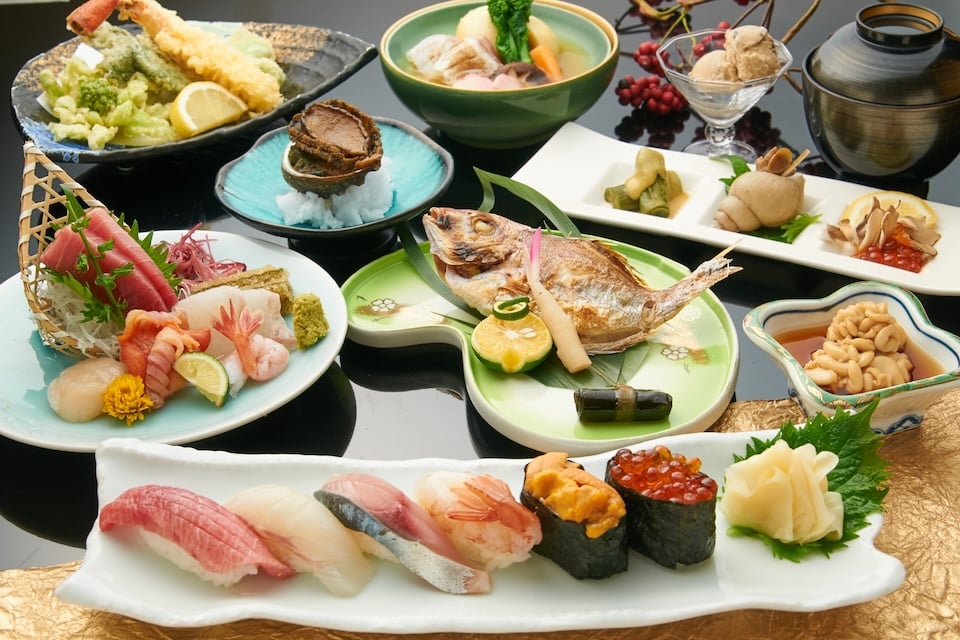
A private kaiseki dinner in Tokyo elevates dining into an immersive cultural journey. VIP guests may reserve entire restaurants or private rooms, with chefs personally presenting each seasonal course and tailoring menus to favorites such as matsutake mushrooms or premium seafood. Antique ceramics or lacquerware are often used, adding artistry to the meal.
Pairings curated by dedicated sommeliers—whether junmai daiginjo sake, Burgundy wines, or rare Japanese whiskies—highlight the flavors of each dish. Some experiences go further, with collaborations like craft gin cocktails or menus designed around regional specialties.
Venues can be equally remarkable: temples, art museums, or candlelit gardens that set an unforgettable atmosphere. Occasionally, artisans or musicians join to introduce their crafts, making the evening a holistic expression of Japanese omotenashi. Personalized and refined, these kaiseki pairings offer memories that linger far beyond the final course.

Conclusion: Delivering Memorable Tokyo Experiences for Foreign Visitors

Tokyo seamlessly blends tradition with modernity, offering experiences that range from must-see landmarks like Senso-ji to deeply immersive rituals such as tea ceremonies, kaiseki dinners, and private cultural performances. The key is omotenashi – heartfelt Japanese hospitality – ensuring itineraries balance iconic sights with unique, tailored activities.
From pacing trips to align with the seasons, to arranging dietary accommodations or surprise encounters, the city offers infinite ways to astonish and delight foreign guests. As the saying ichigo ichie (“one time, one meeting”)reminds us, each Tokyo moment is precious. With the help of experts such as MOTENAS JAPAN, concierges, and artisans, hosts can create unforgettable memories for their VIP visitors in 2025 and beyond.

旅をこよなく愛するWebライター。アジアを中心に16の国にお邪魔しました(今後も更新予定)。
ワーホリを機にニュージーランドに数年滞在。帰国後は日本の魅力にとりつかれ、各地のホテルで勤務。
日本滞在が、より豊かで思い出深いものになるように、旅好きならではの視点で心を込めてお届けします!





